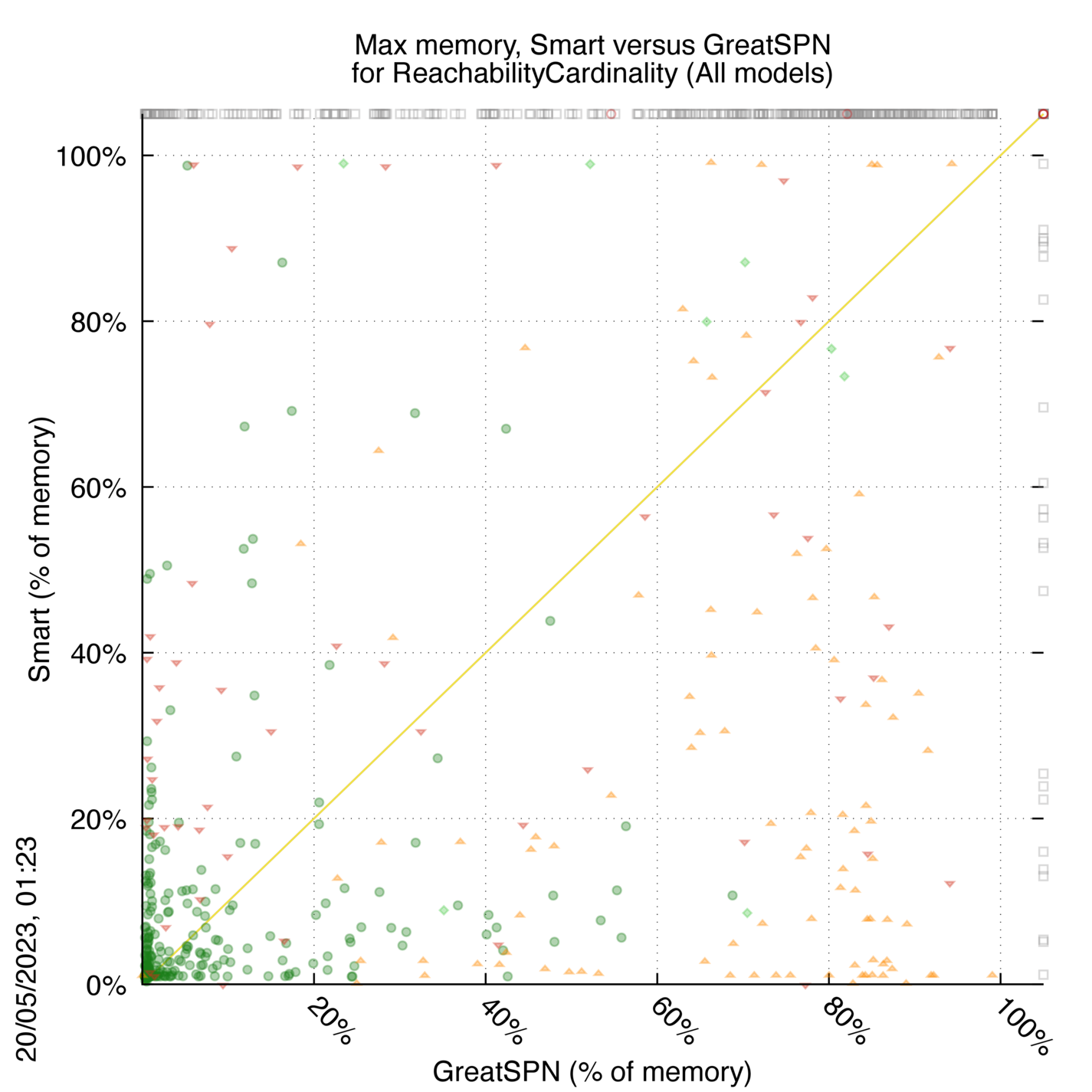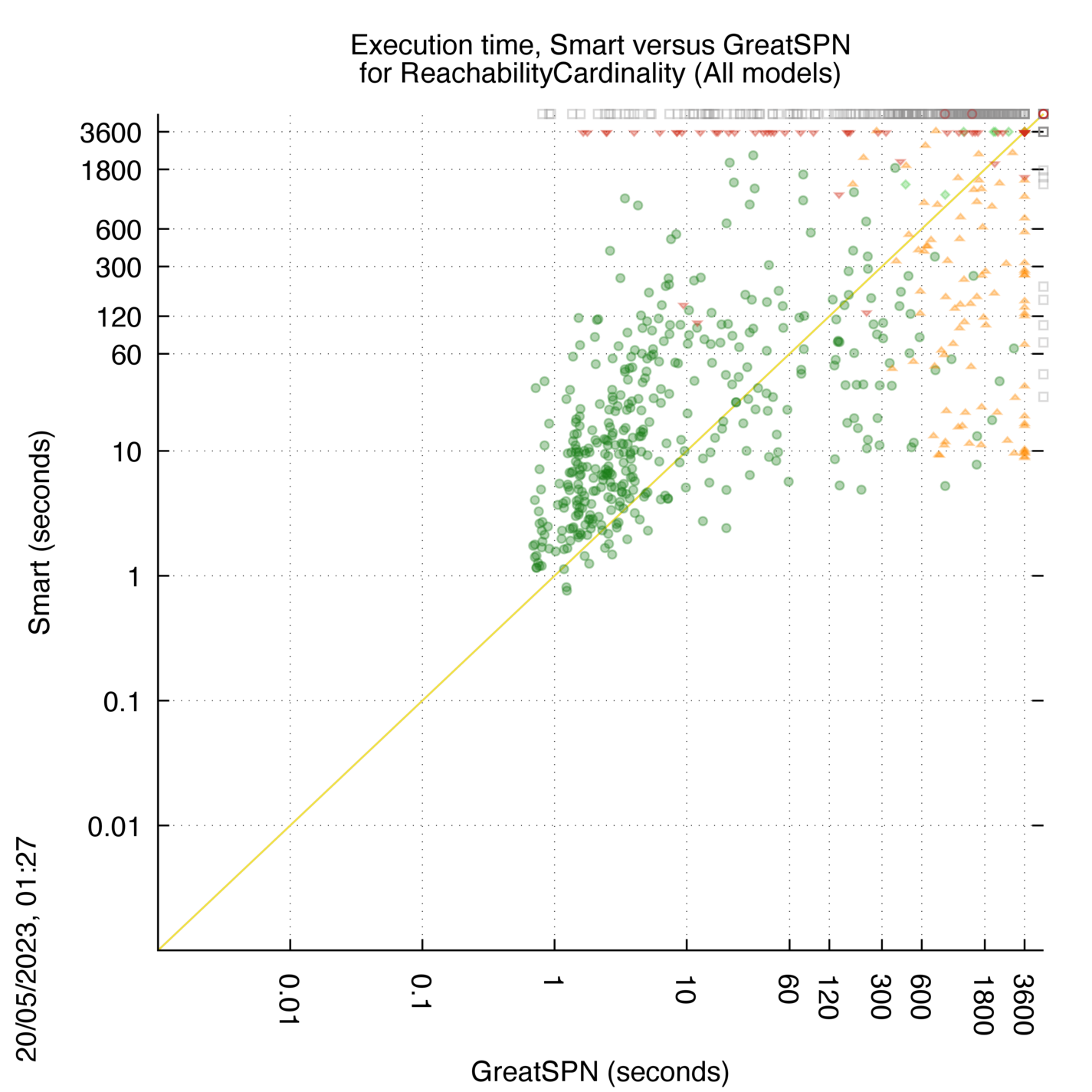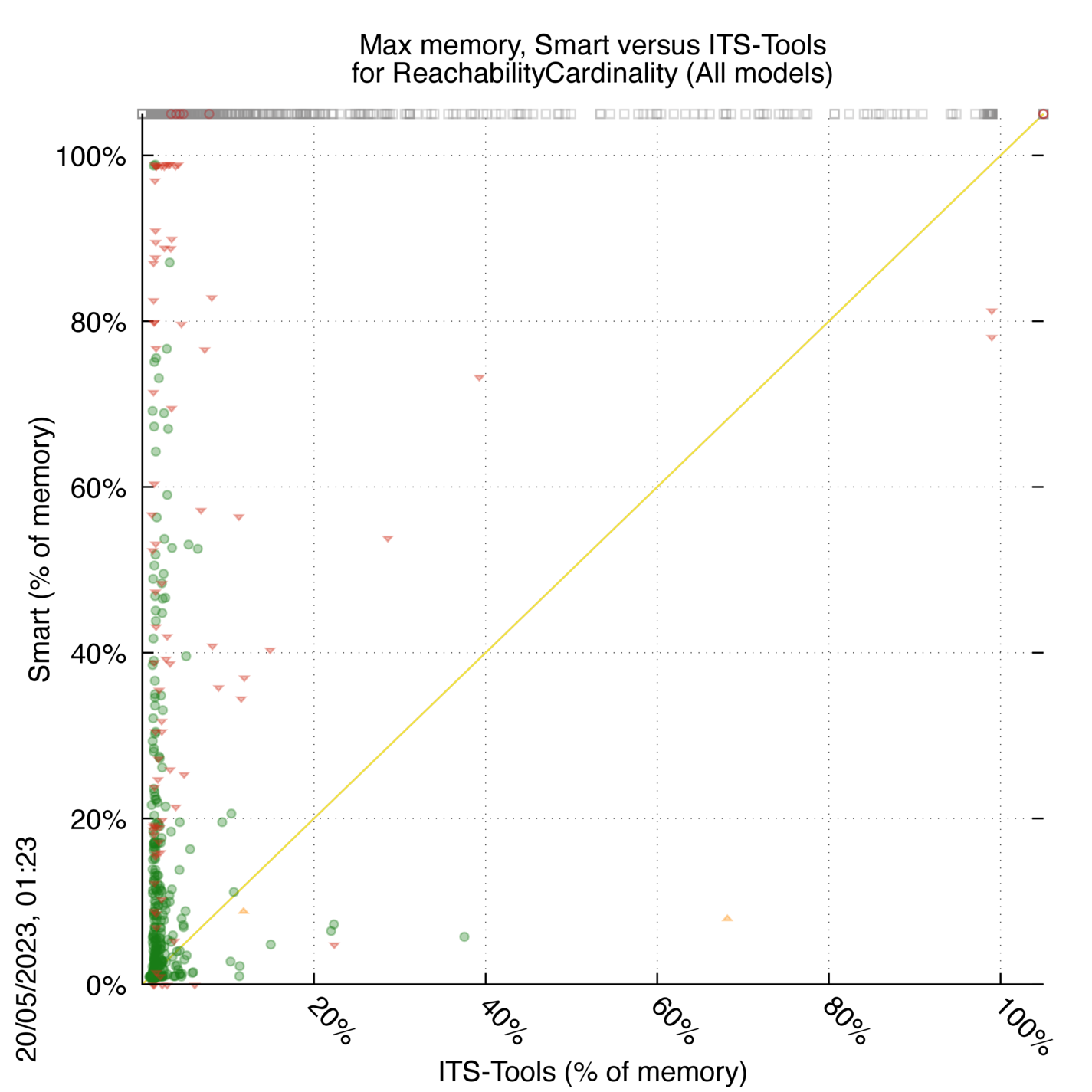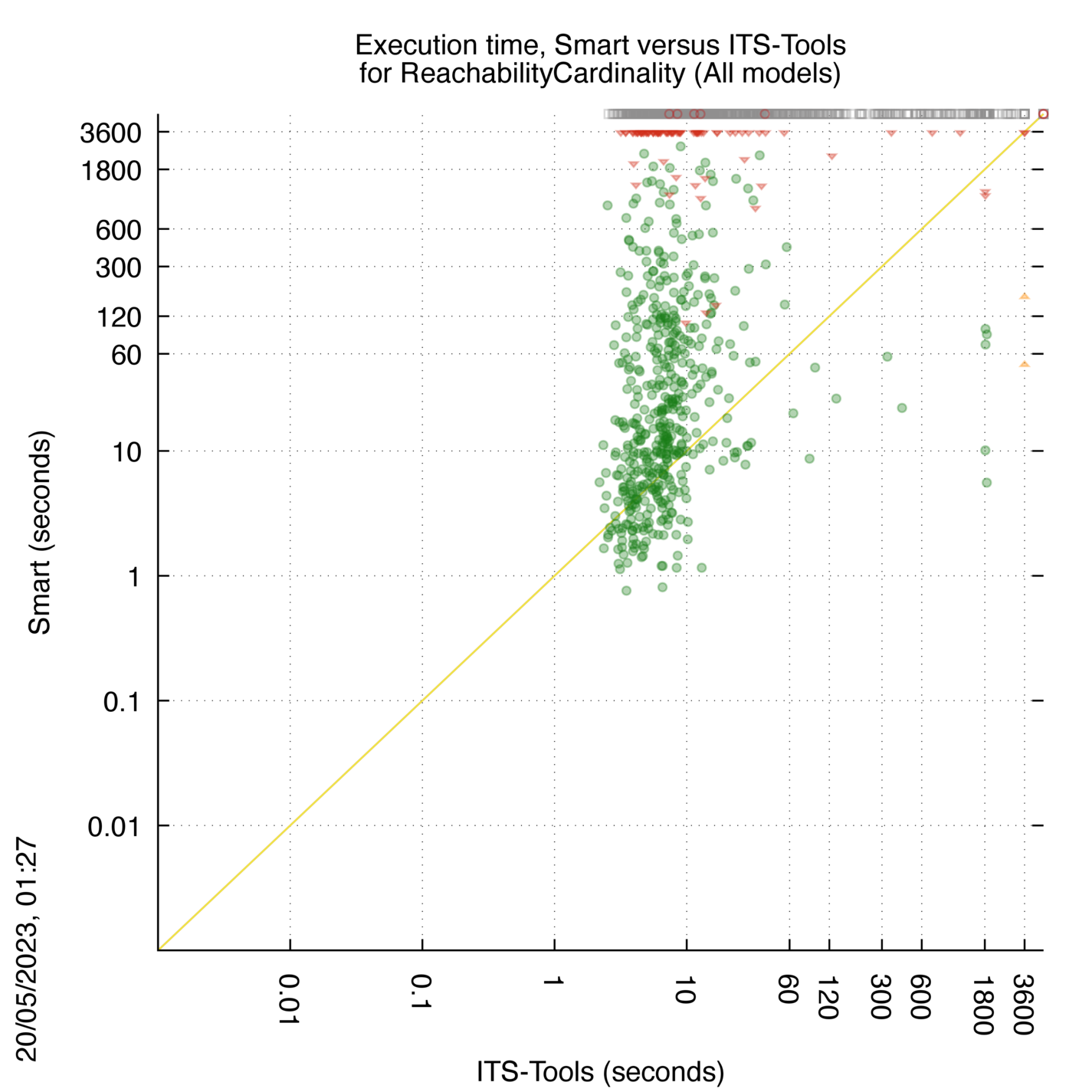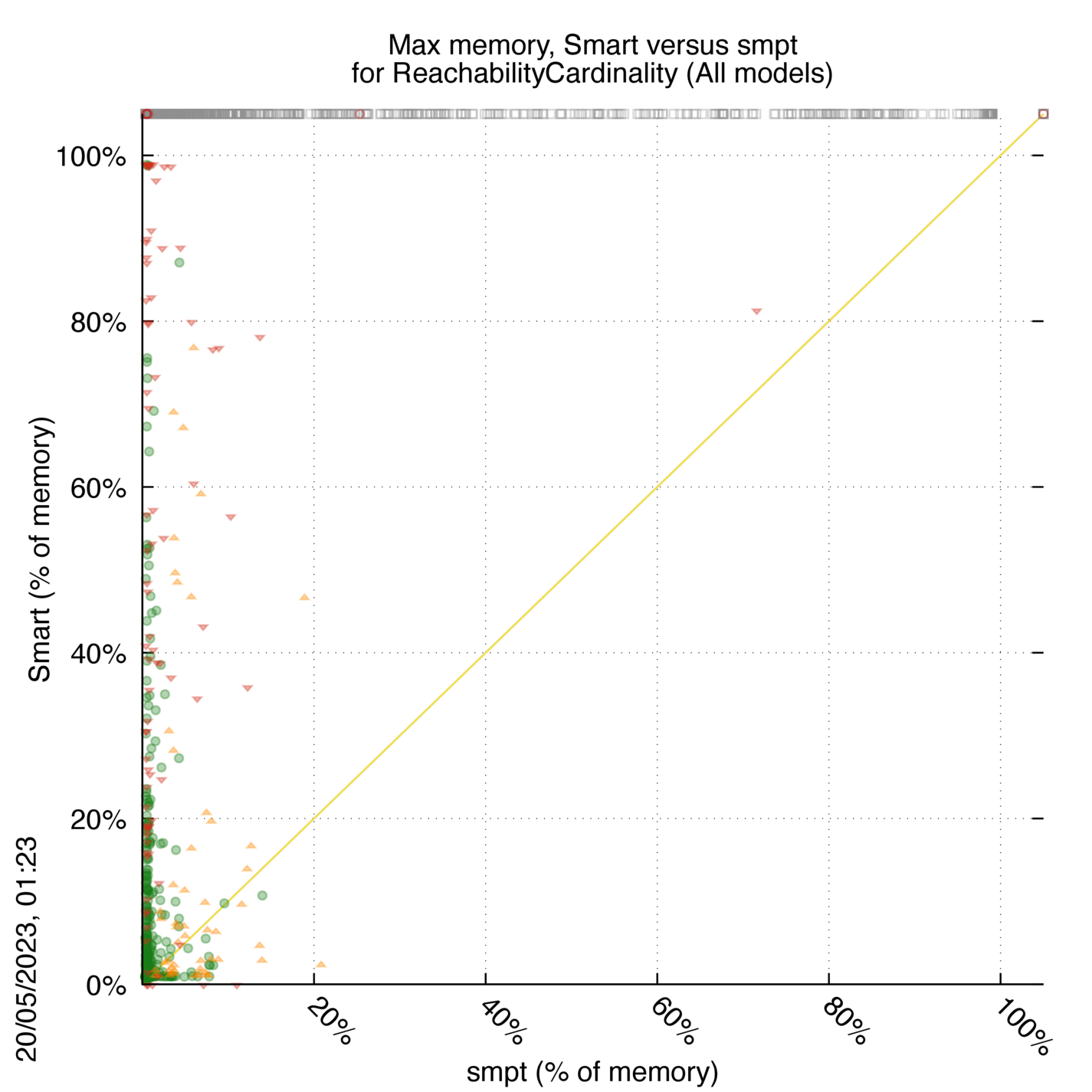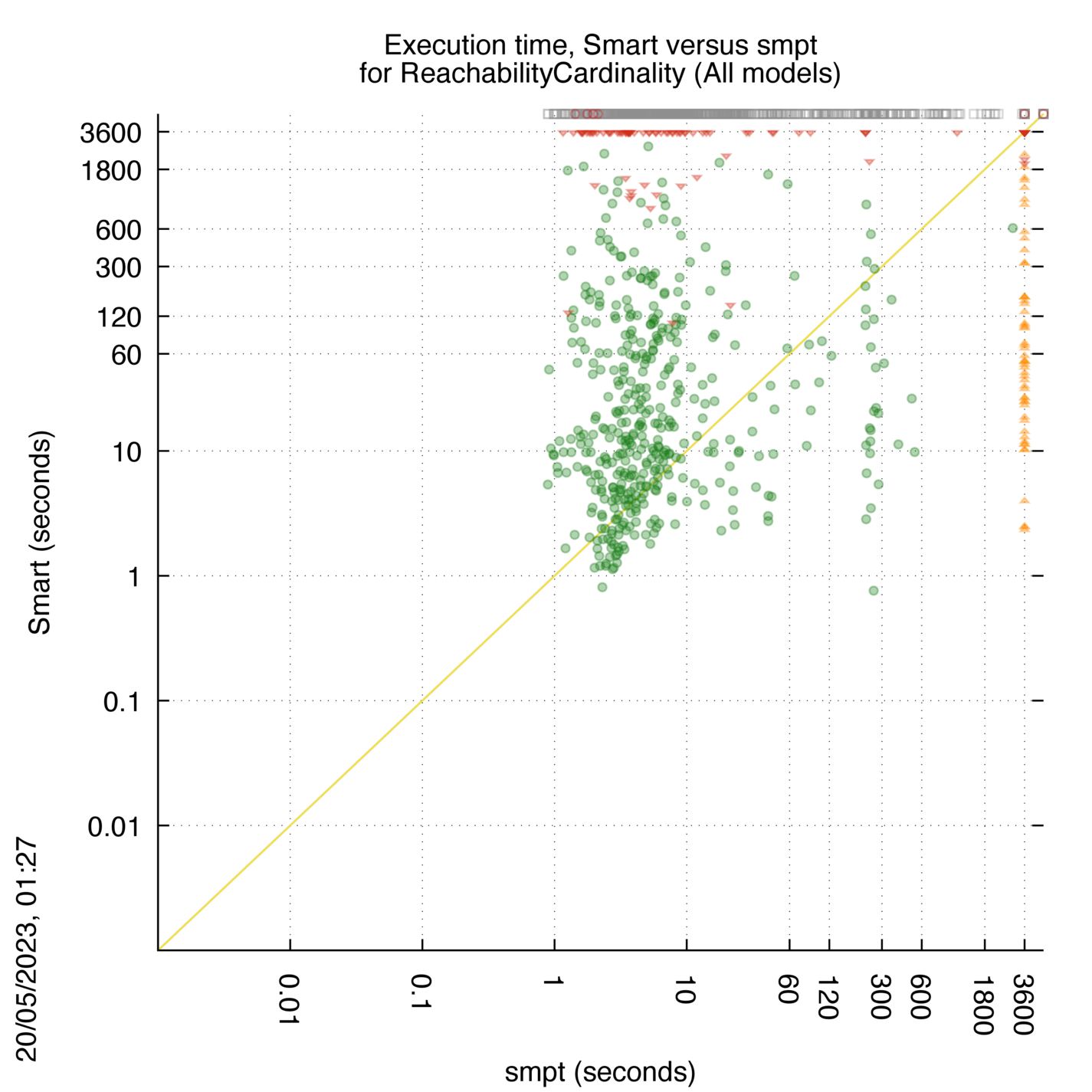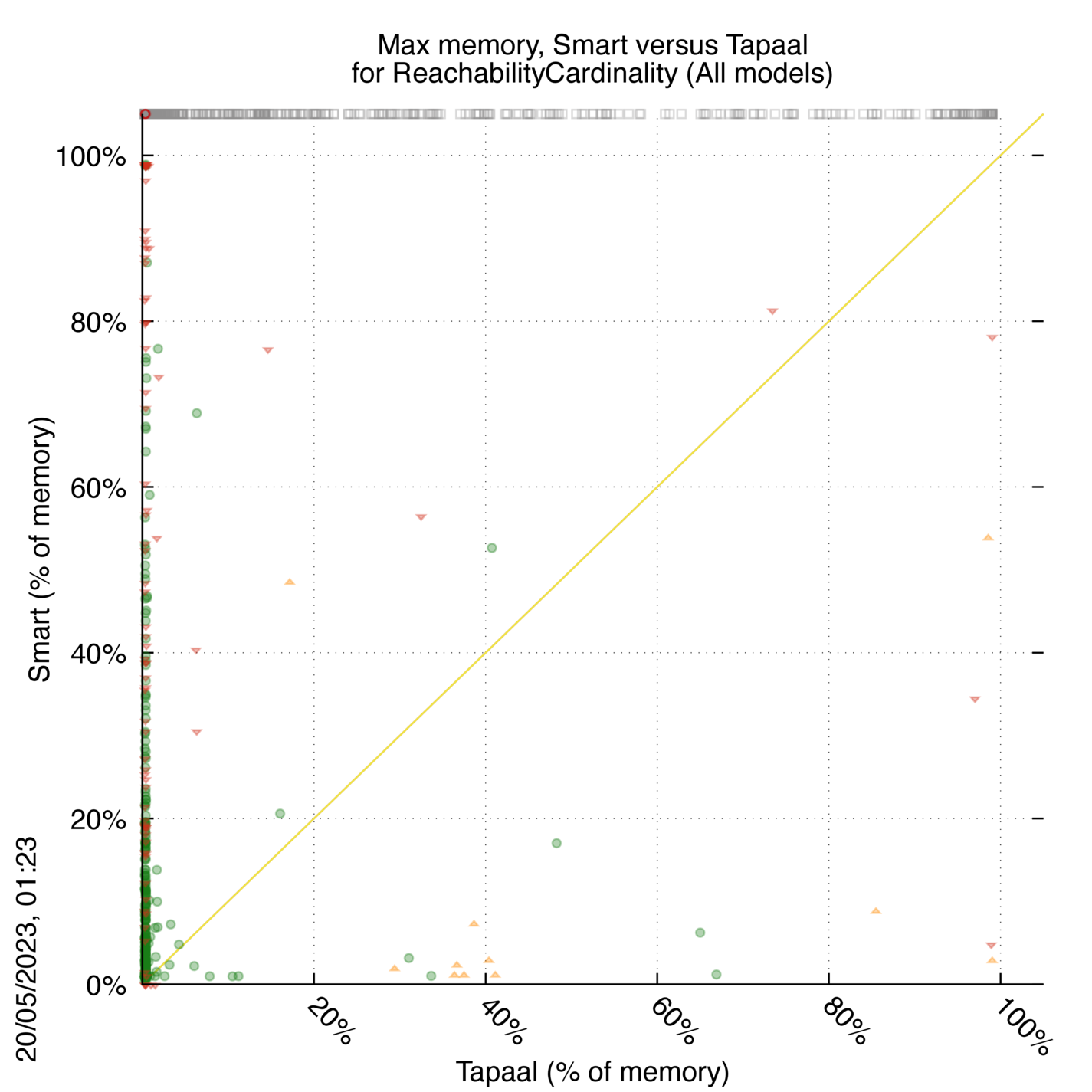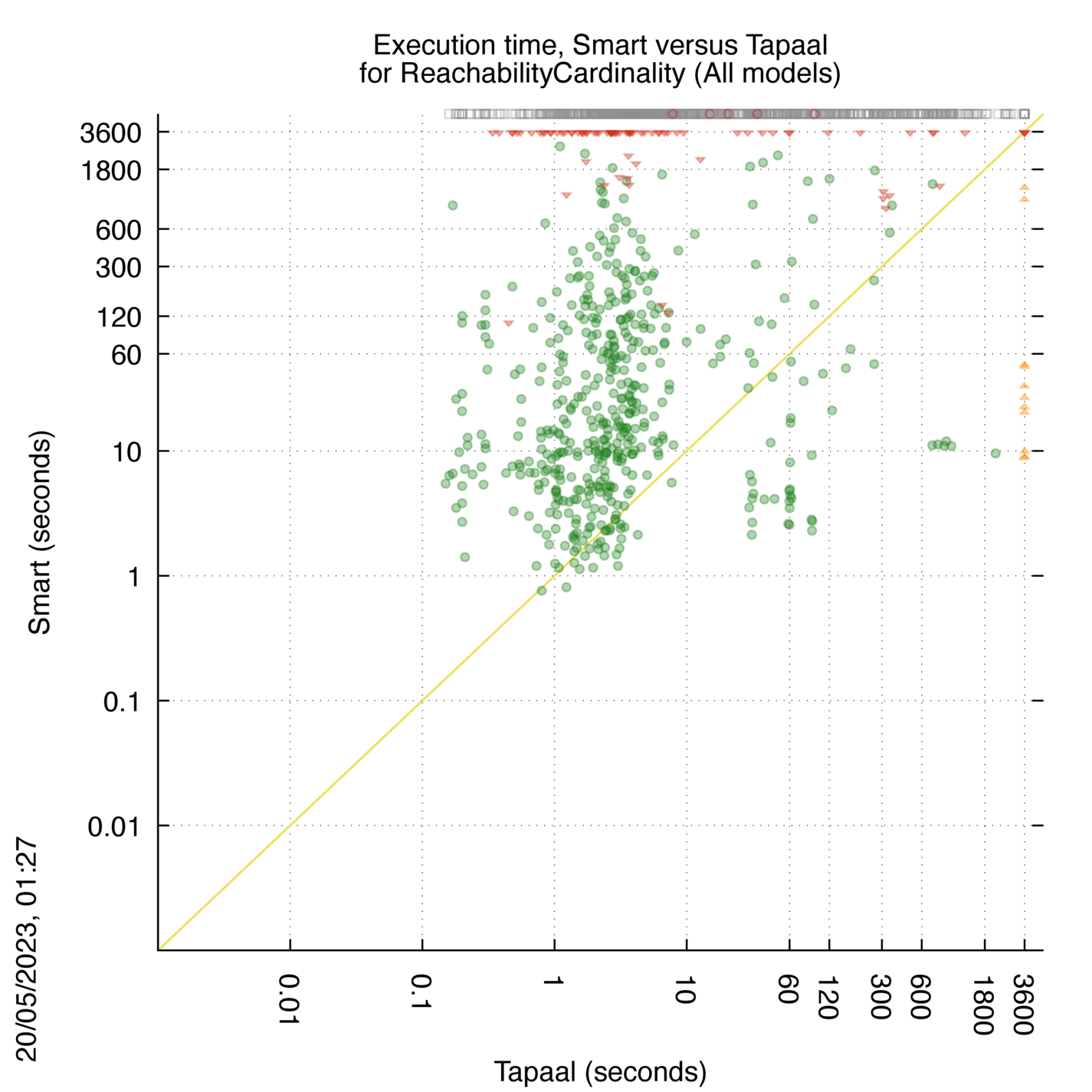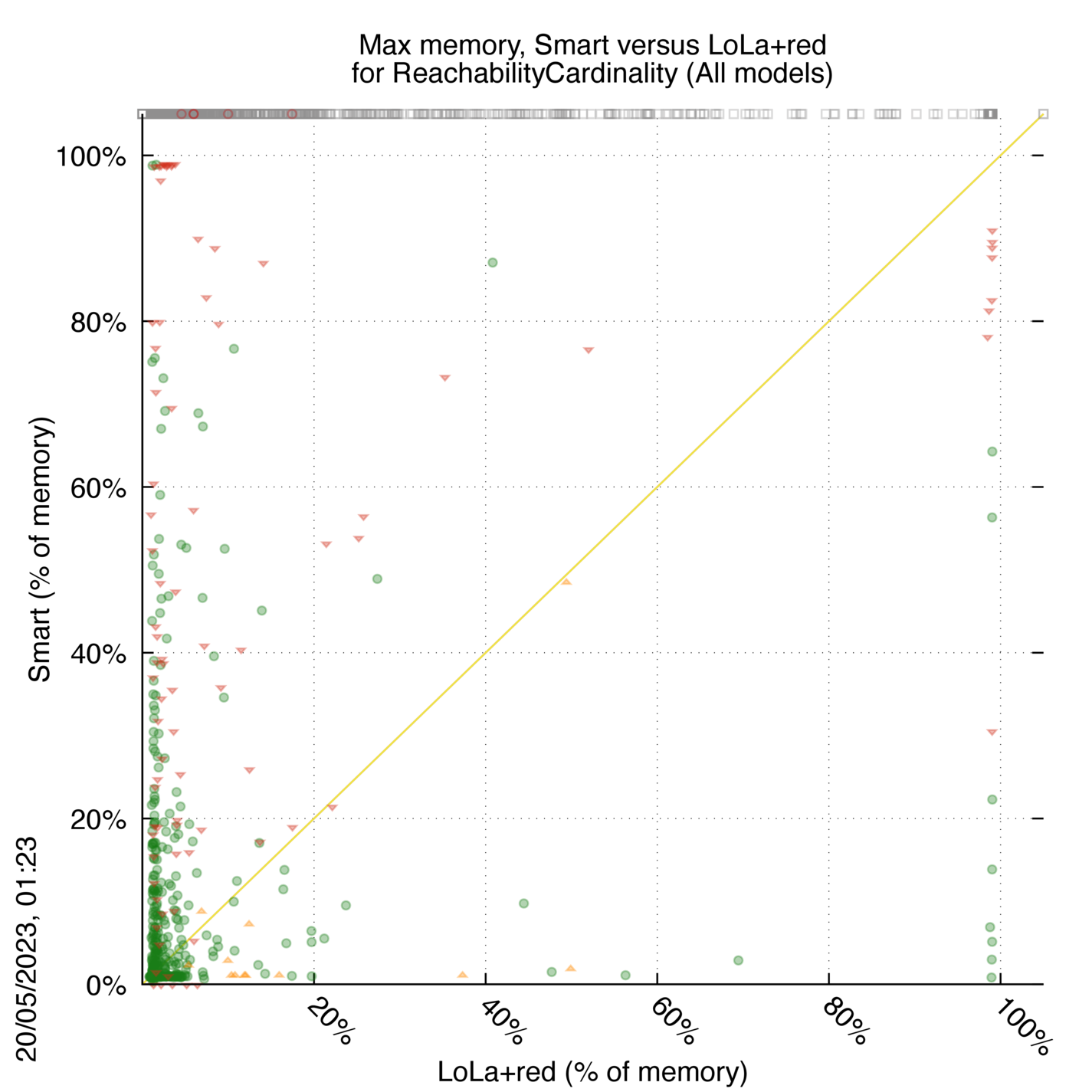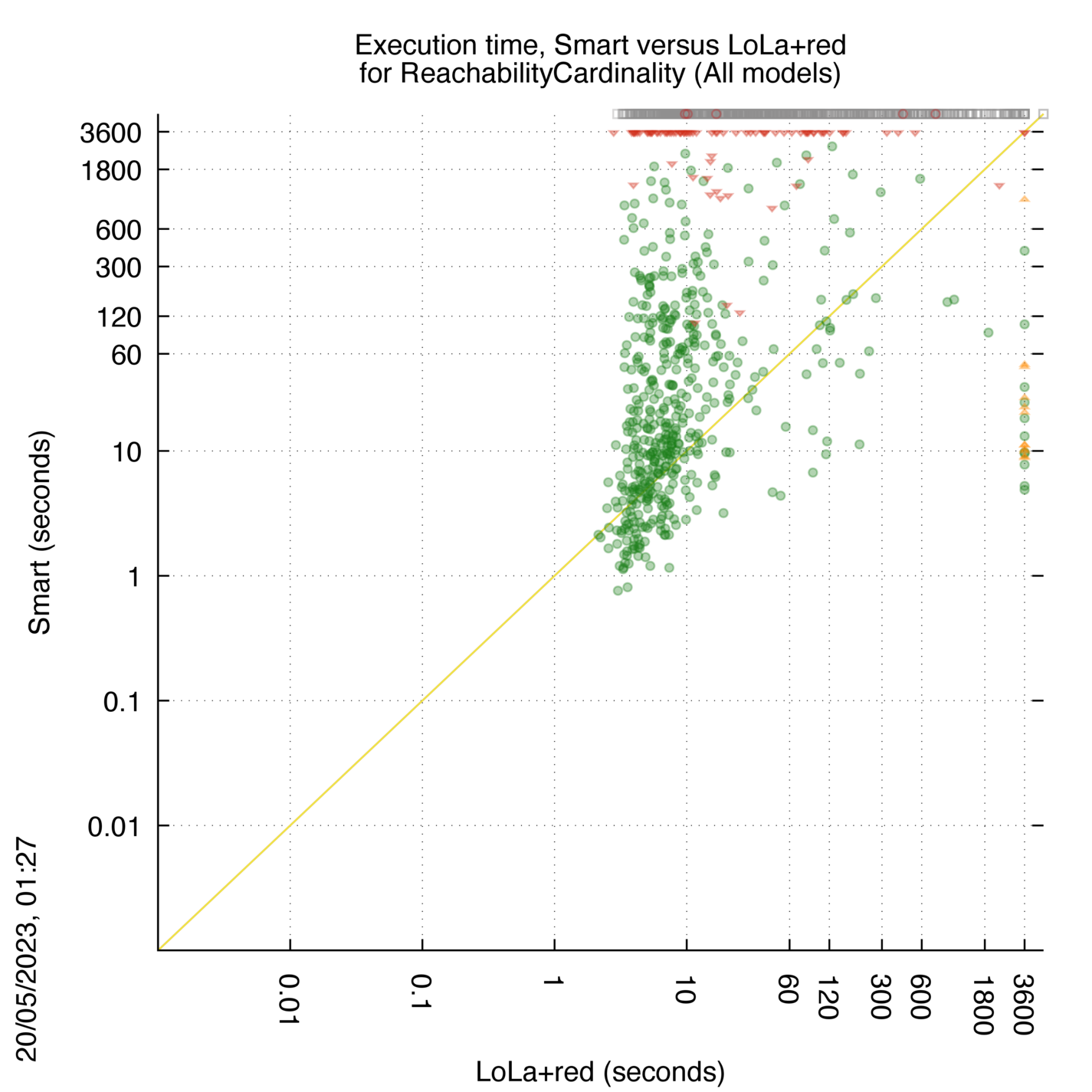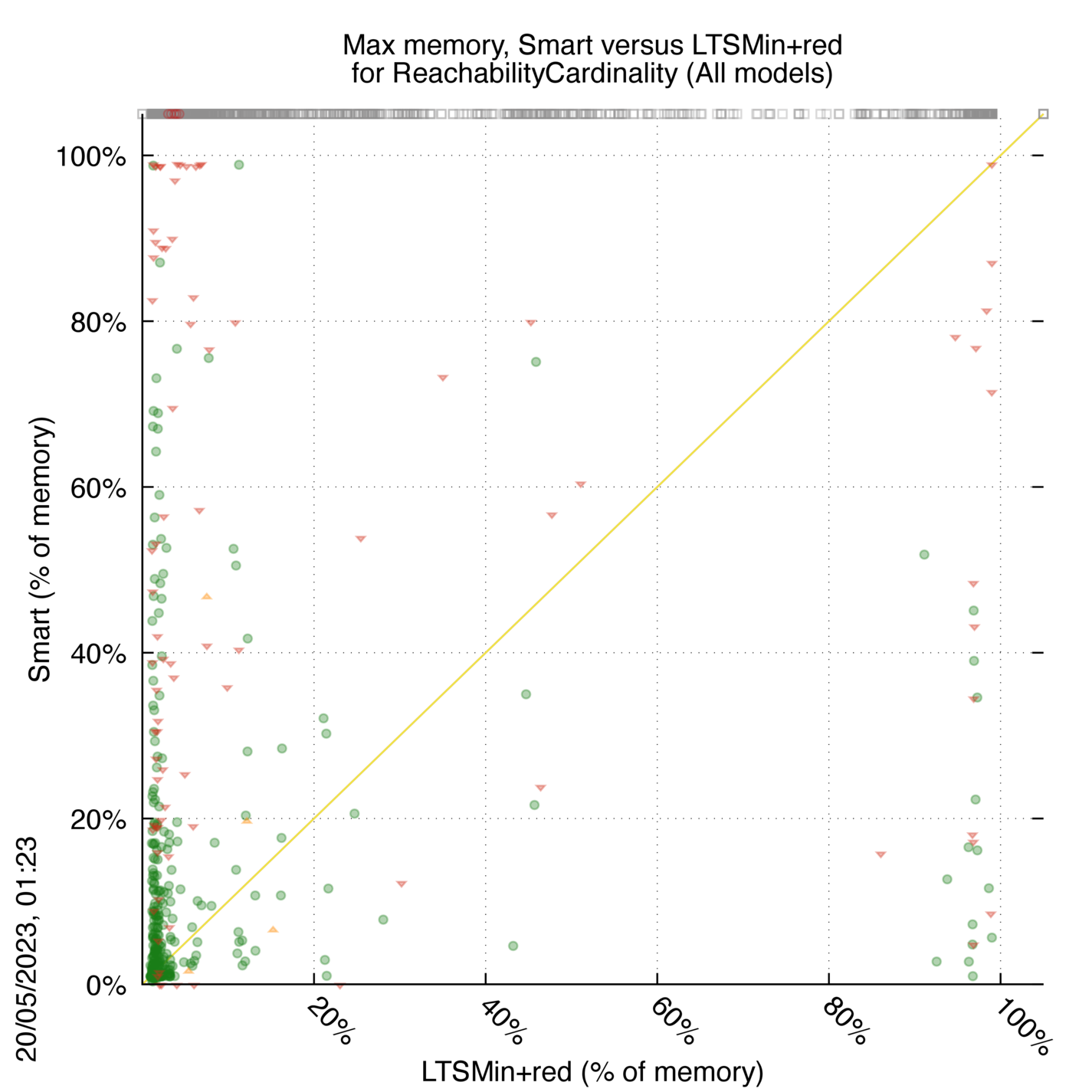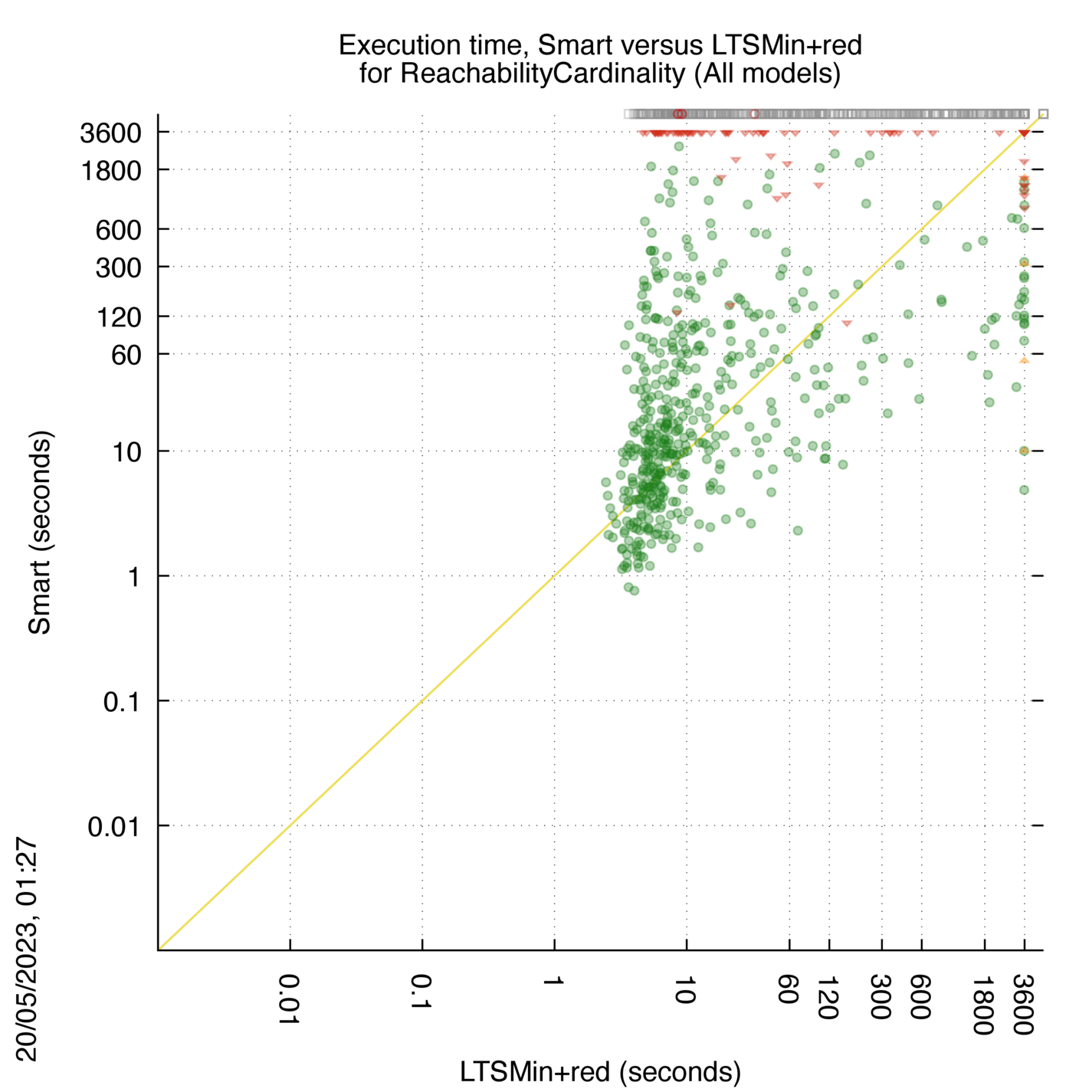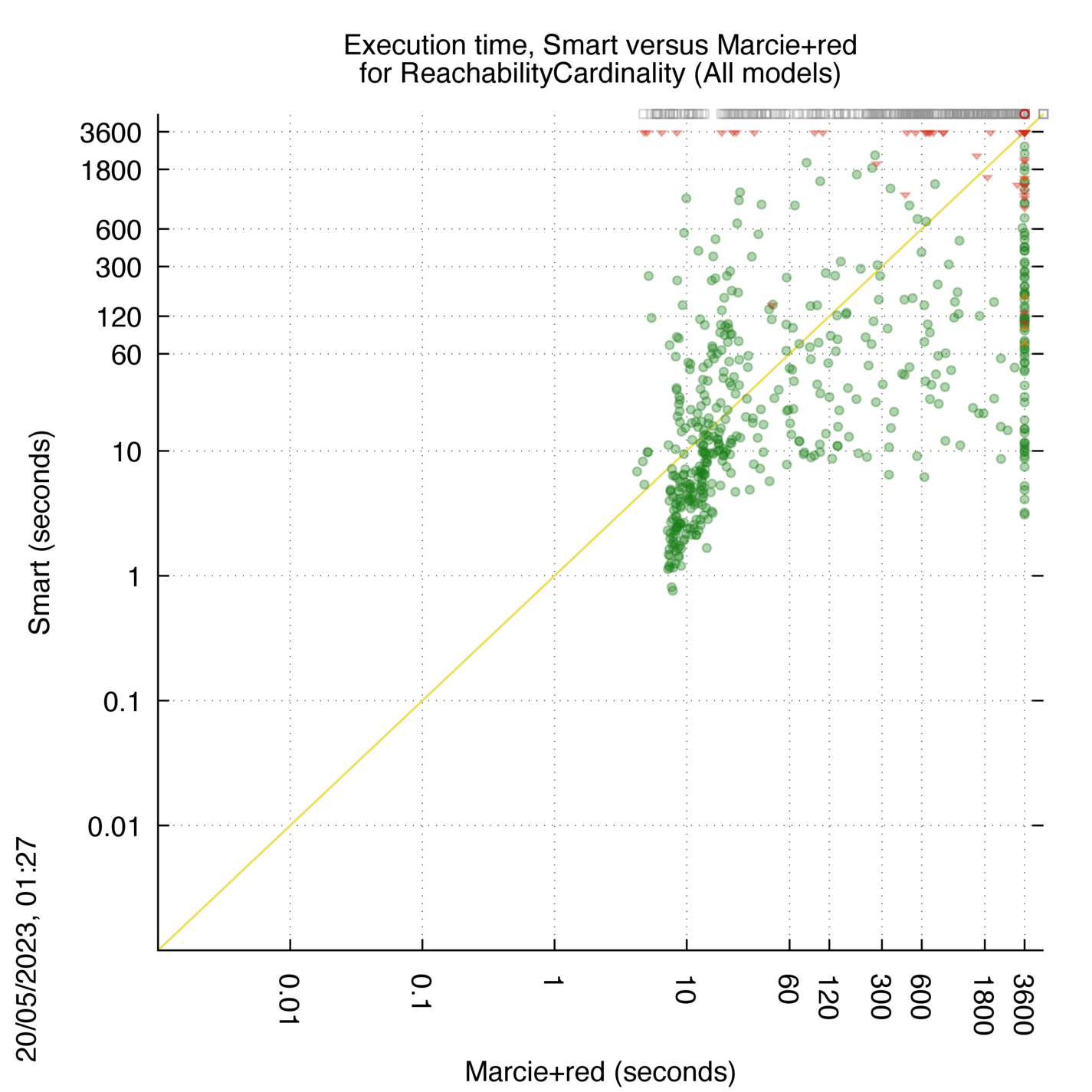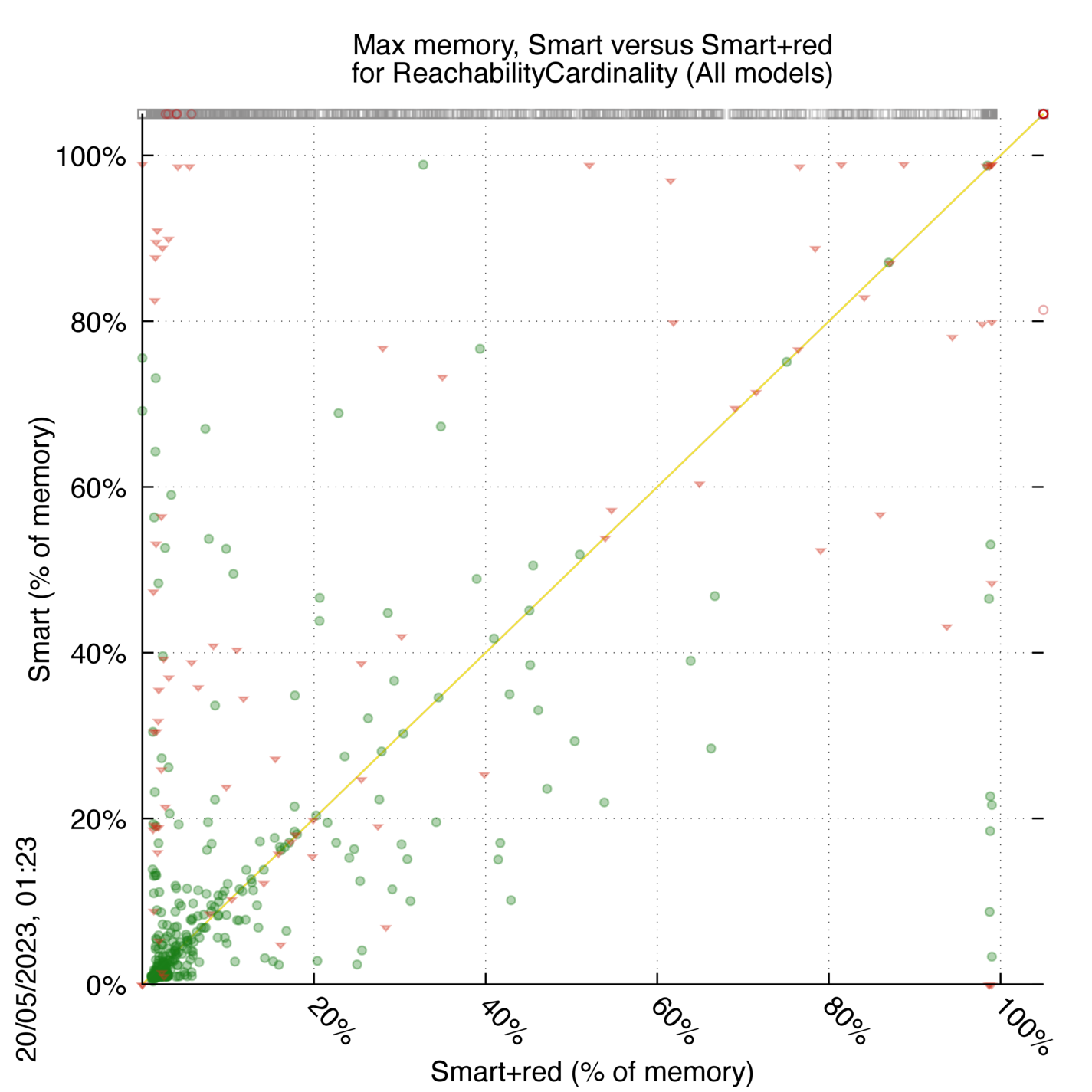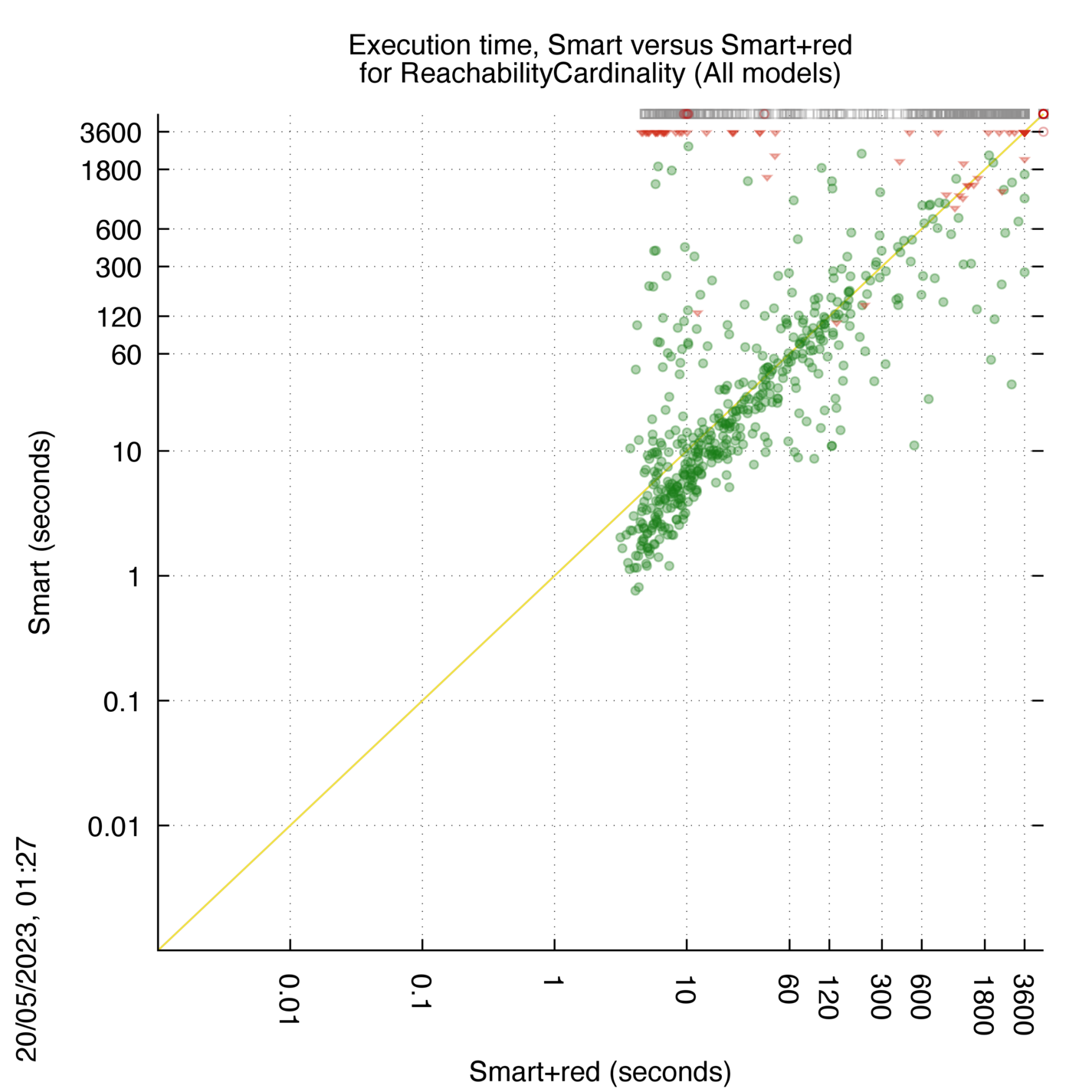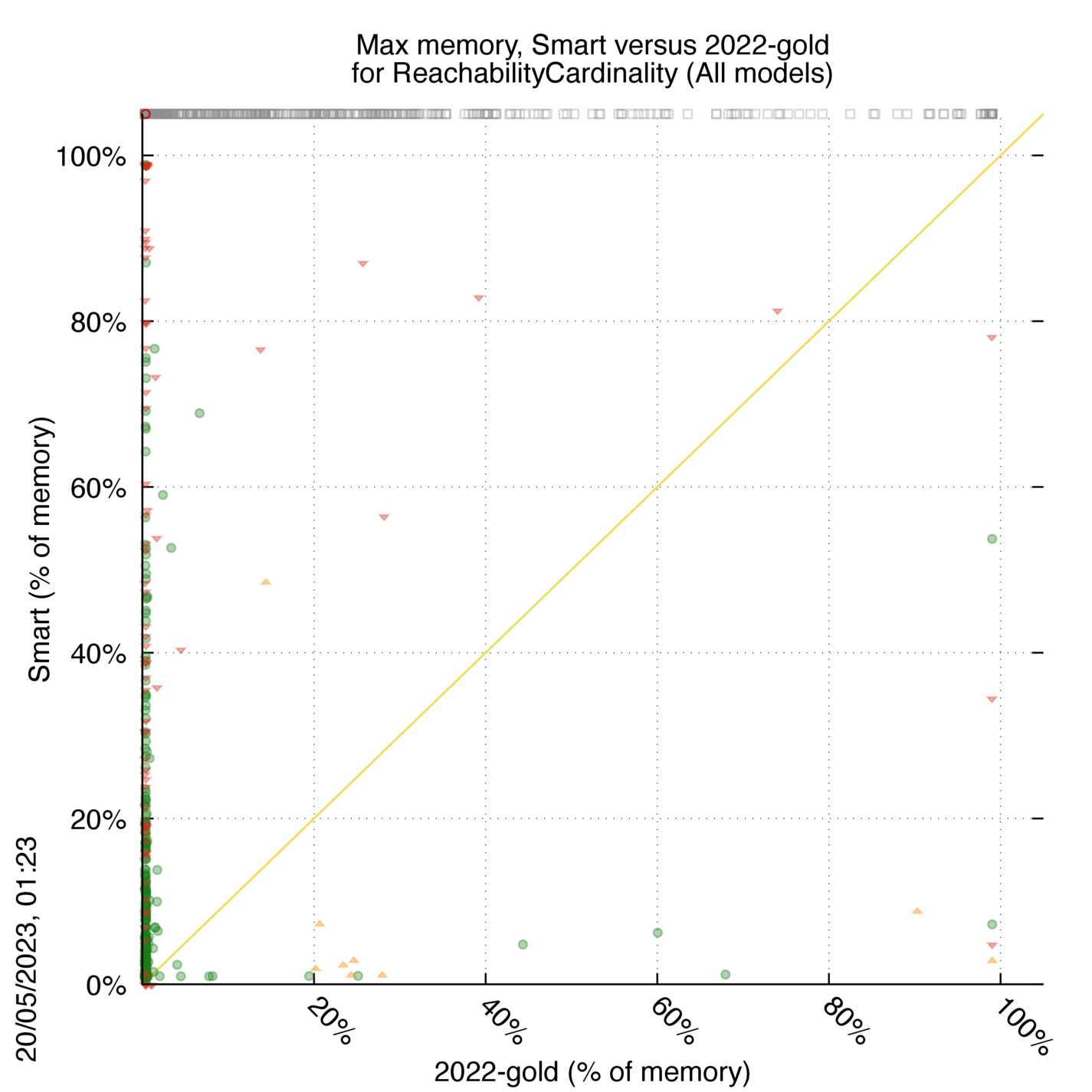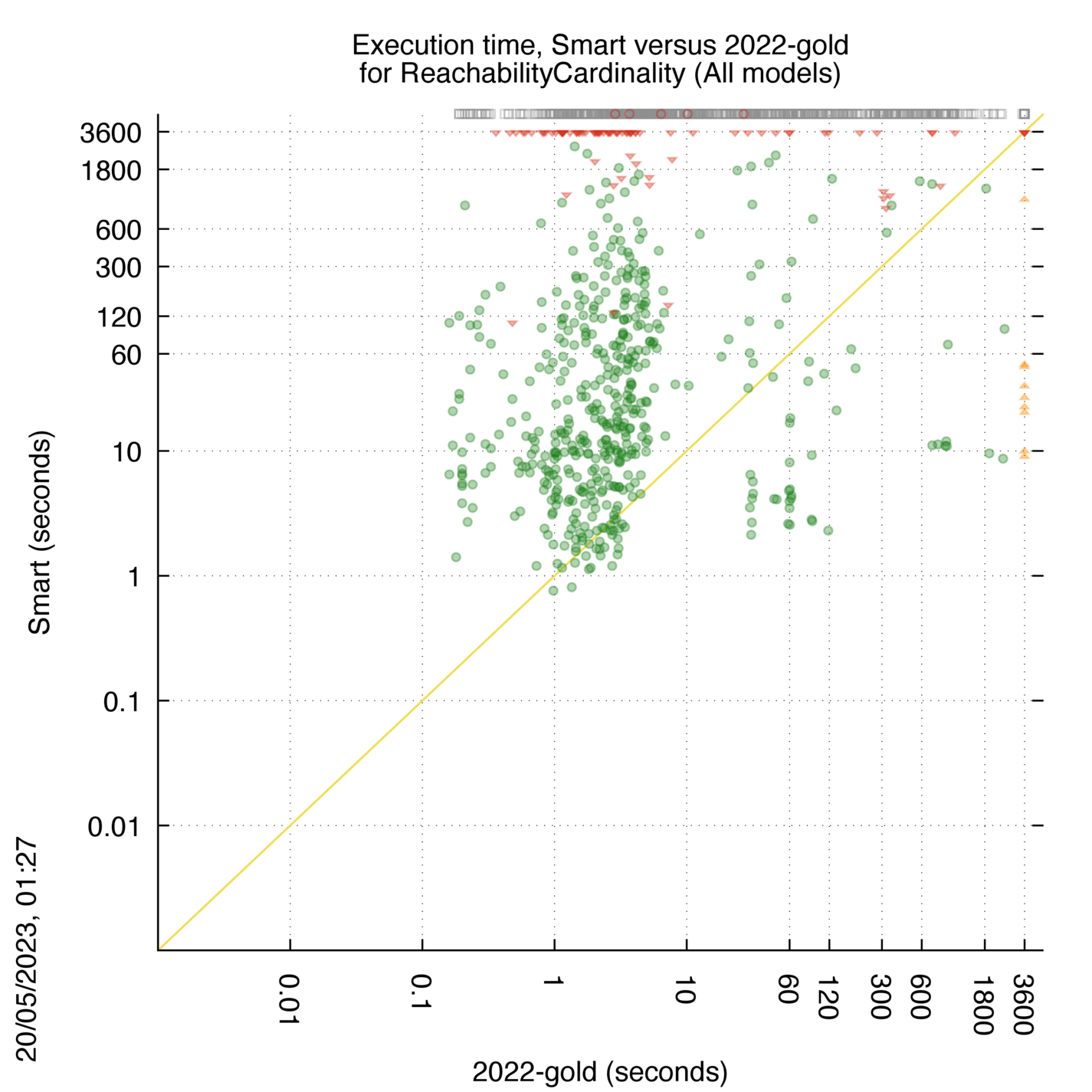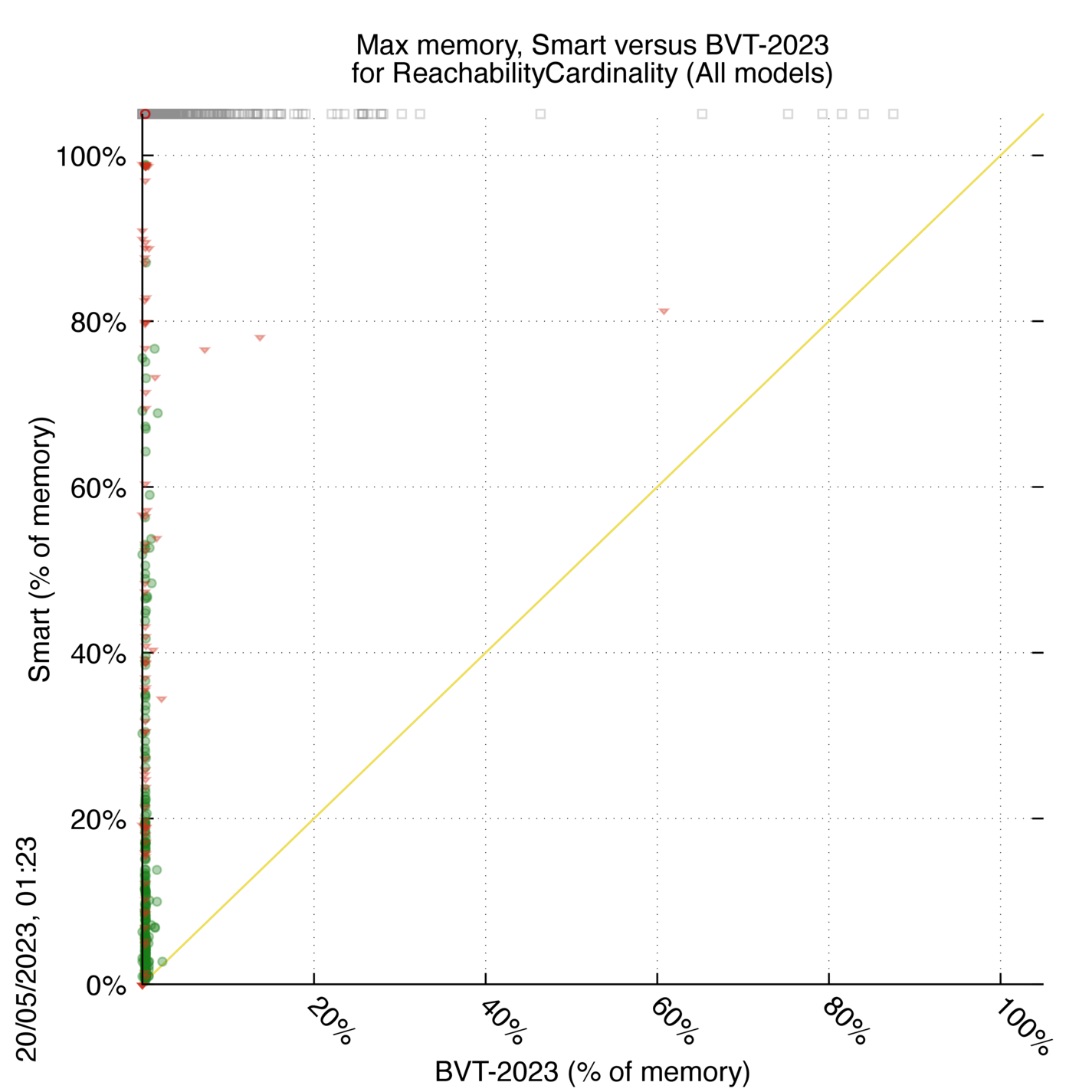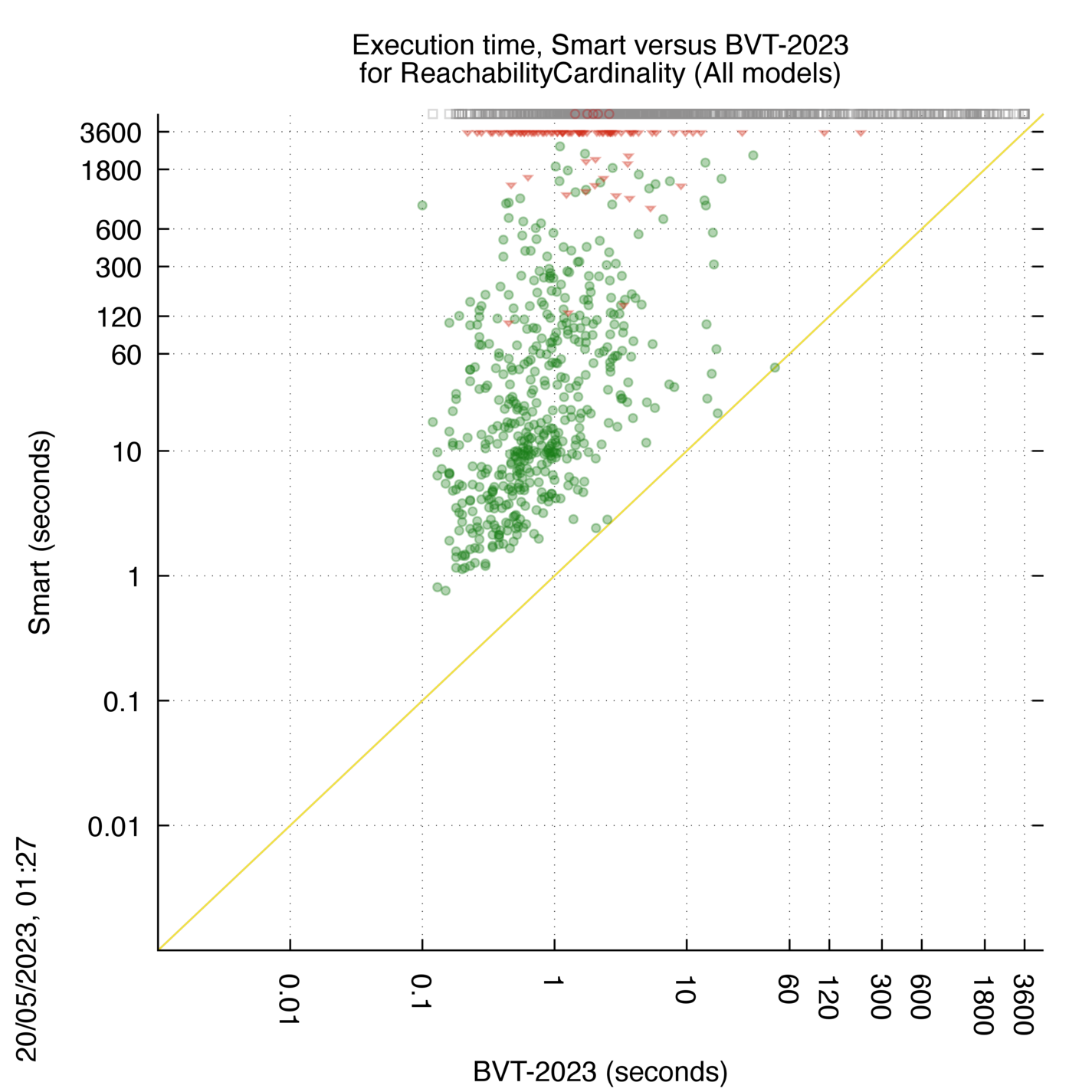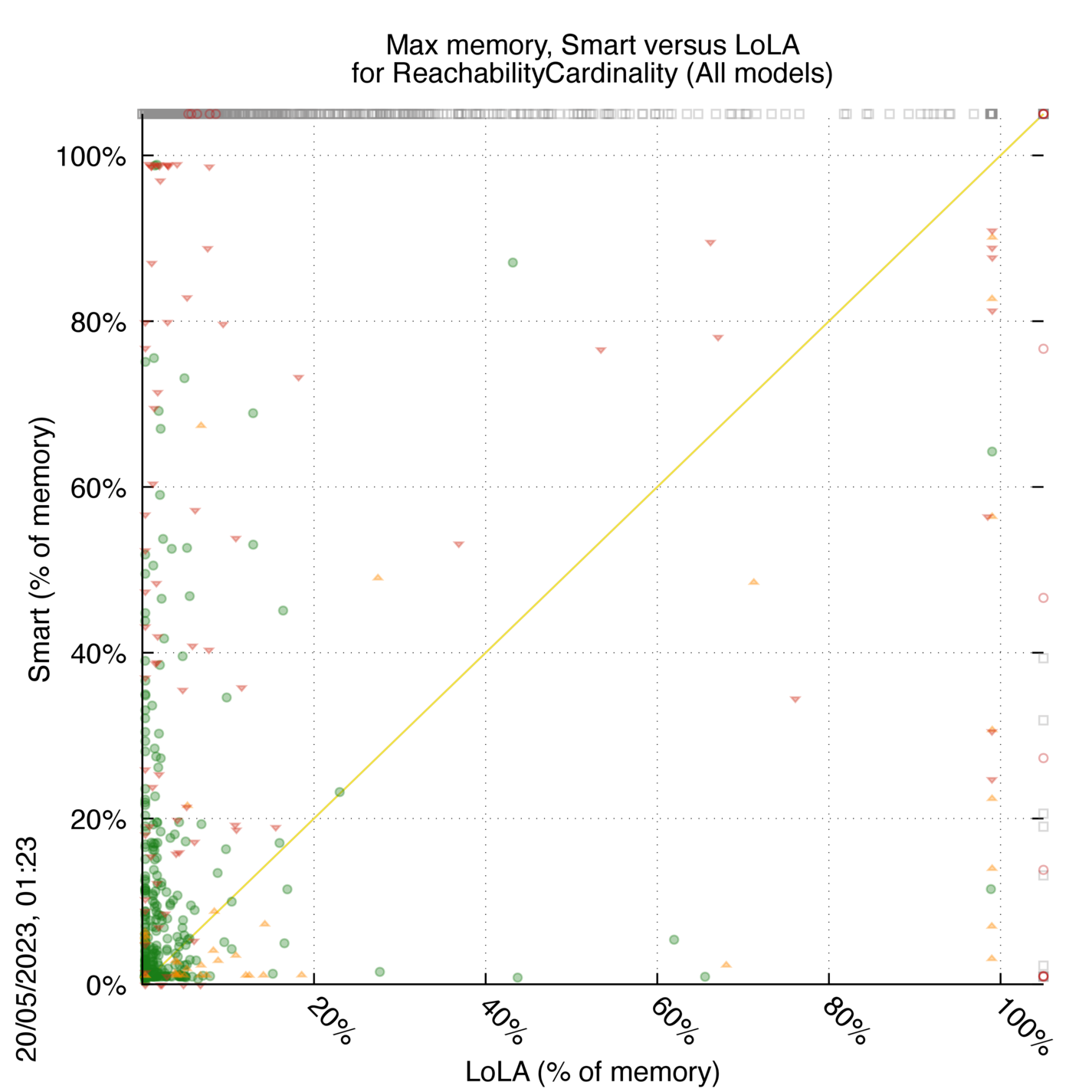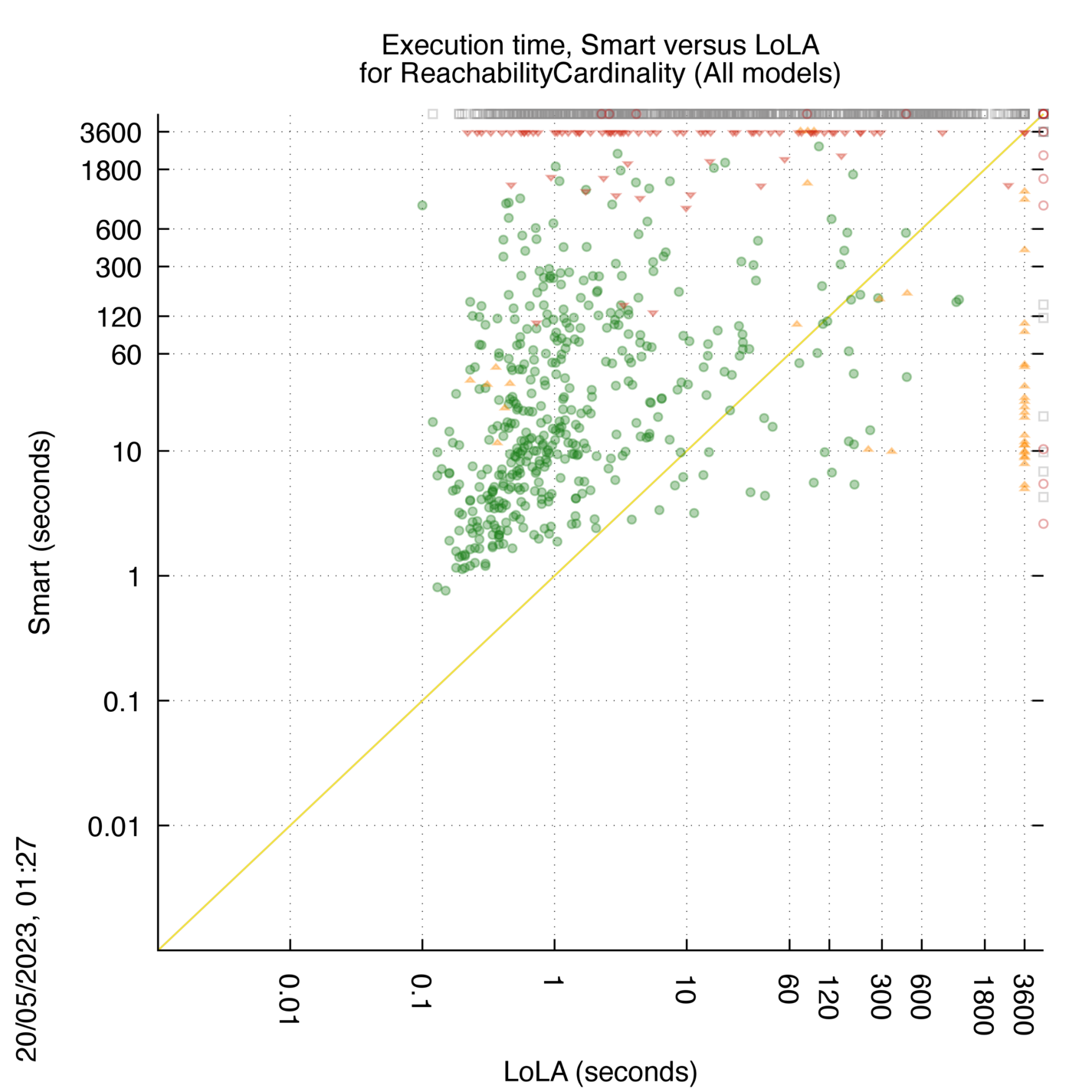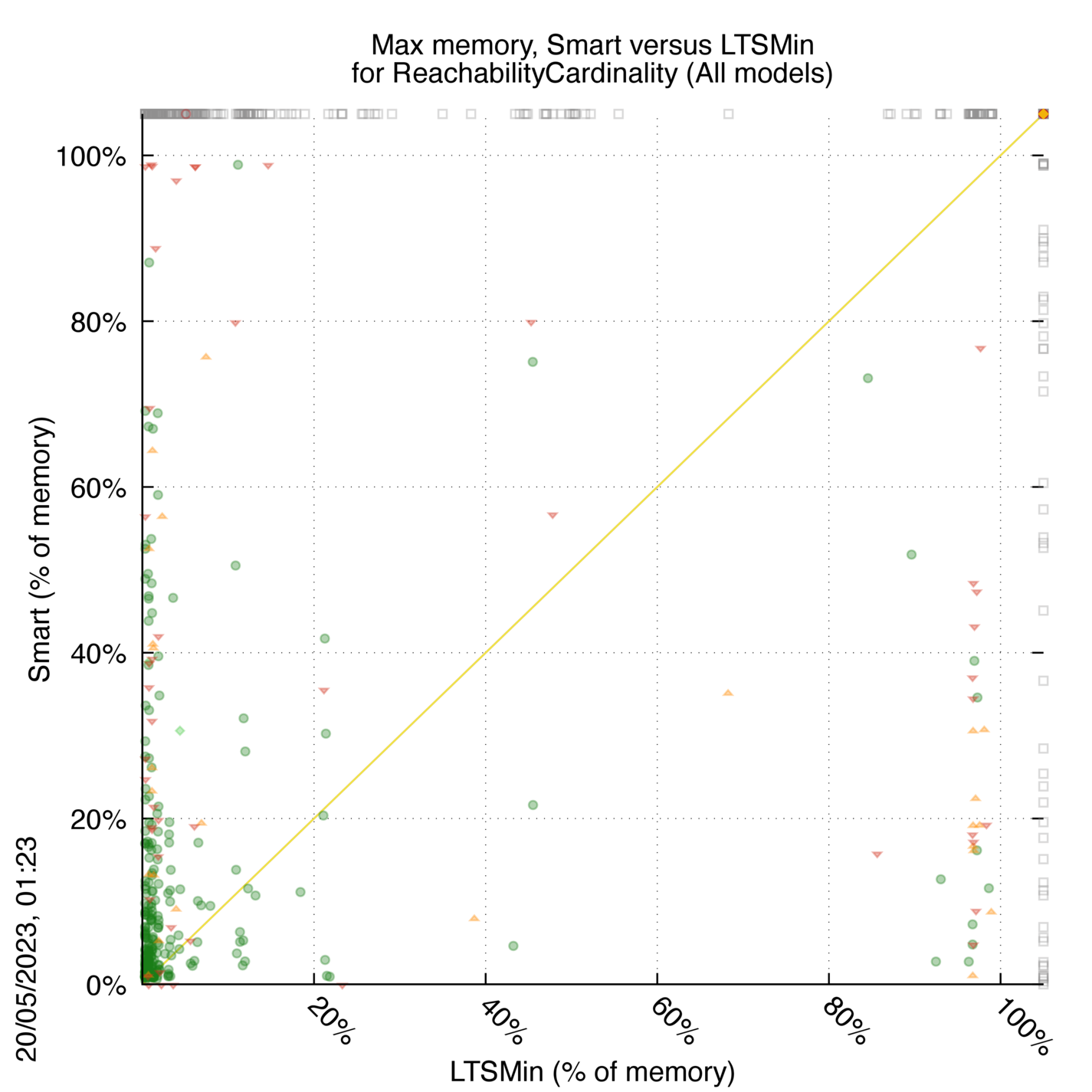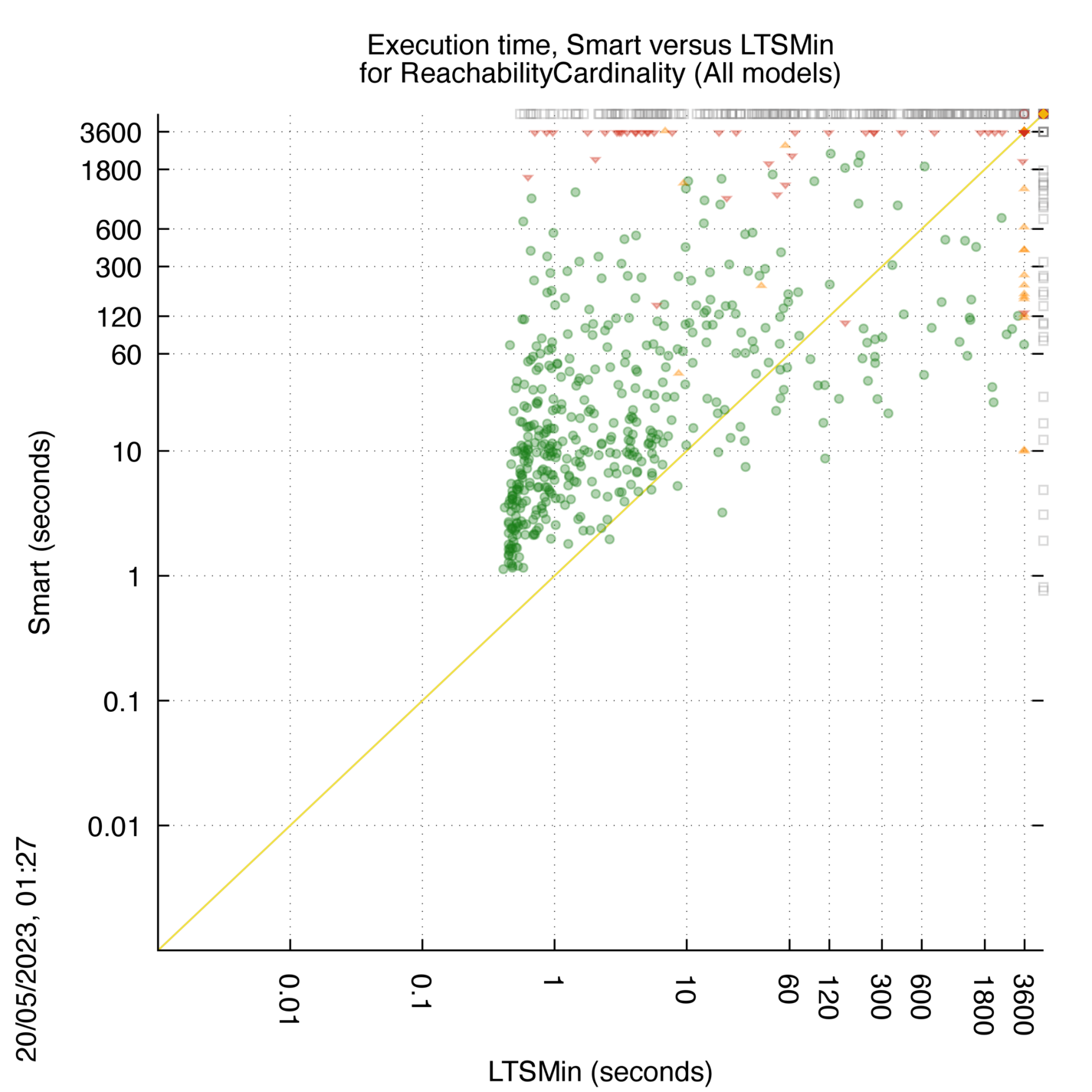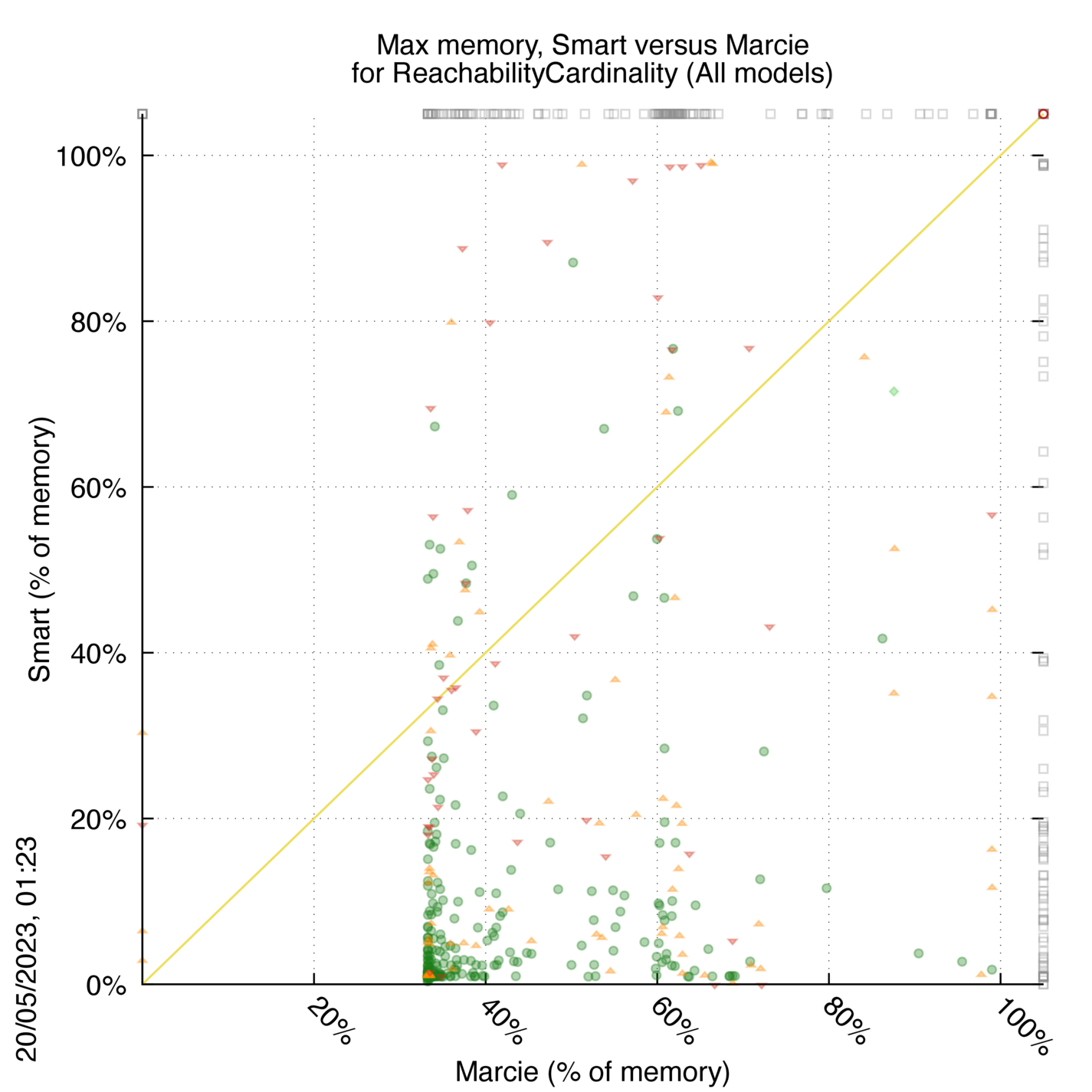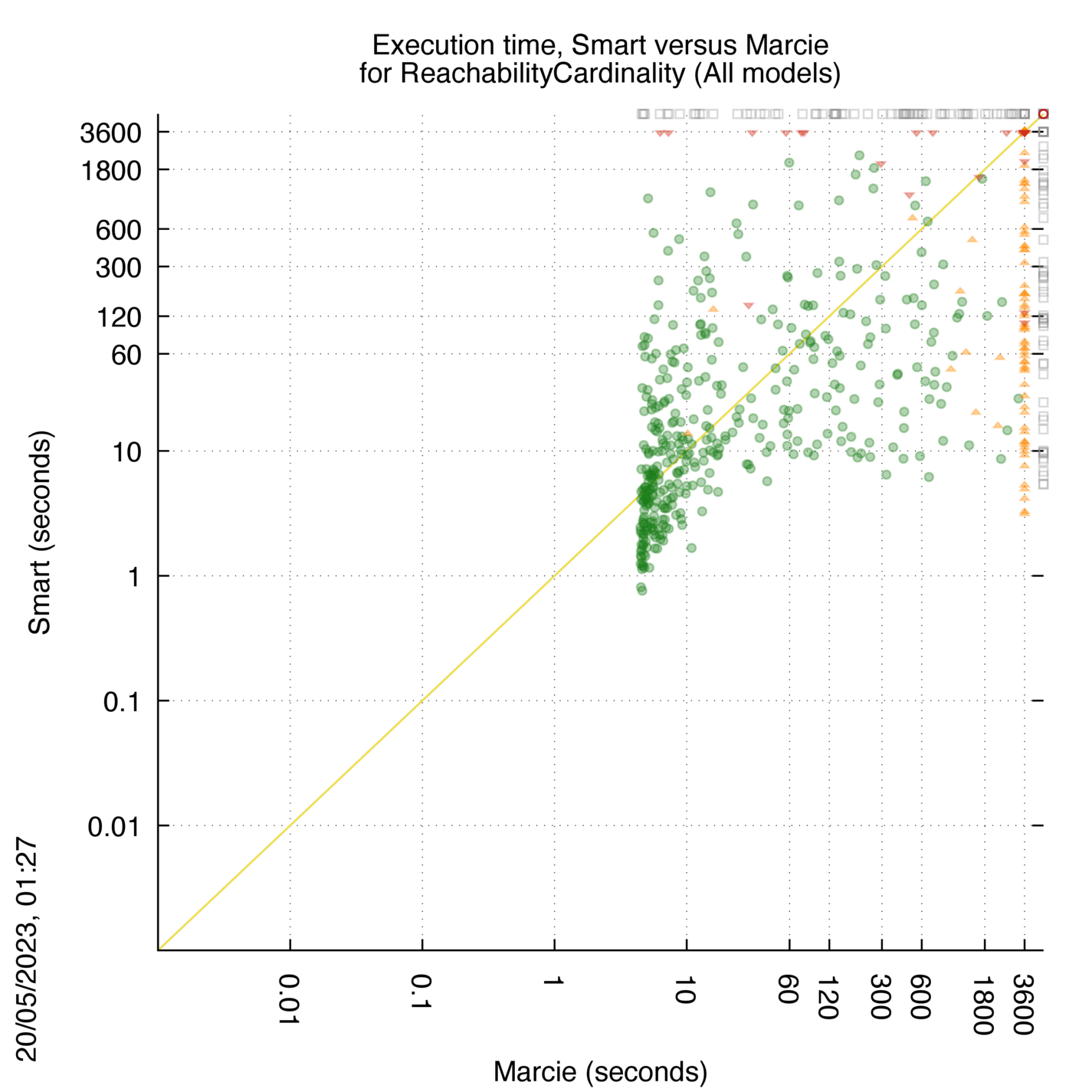Introduction
This page presents how Smart do cope efficiently with the ReachabilityCardinality examination face to the other participating tools. In this page, we consider «All» models.
The next sections will show chart comparing performances in terms of both memory and execution time.The x-axis corresponds to the challenging tool where the y-axes represents Smart' performances. Thus, points below the diagonal of a chart denote comparisons favorables to the tool while others corresponds to situations where the challenging tool performs better.
You might also find plots out of the range that denote the case were at least one tool could not answer appropriately (error, time-out, could not compute or did not competed).
Smart versus GreatSPN
Some statistics are displayed below, based on 3356 runs (1678 for Smart and 1678 for GreatSPN, so there are 1678 plots on each of the two charts). Each execution was allowed 1 hour and 16 GByte of memory. Then performance charts comparing Smart to GreatSPN are shown (you may click on one graph to enlarge it).
| Statistics on the executions | ||||||
| Smart | GreatSPN | Both tools | Smart | GreatSPN | ||
| All computed OK | 23 | 355 | 396 | Smallest Memory Footprint | ||
| Smart = GreatSPN | — | — | 8 | Times tool wins | 219 | 742 |
| Smart > GreatSPN | — | — | 93 | Shortest Execution Time | ||
| Smart < GreatSPN | — | — | 51 | Times tool wins | 205 | 756 |
| Do not compete | 0 | 0 | 0 | |||
| Error detected | 5 | 0 | 0 | |||
| Cannot Compute + Time-out | 353 | 26 | 708 | |||
On the chart below, ![]() denote cases where
the two tools did computed all results without error,
denote cases where
the two tools did computed all results without error,
![]() denote cases where the two tool did computed the
same number of values (but not al values in the examination),
denote cases where the two tool did computed the
same number of values (but not al values in the examination),
![]() denote cases where Smart
computed more values than GreatSPN,
denote cases where Smart
computed more values than GreatSPN,
![]() denote cases where Smart
computed less values than GreatSPN,
denote cases where Smart
computed less values than GreatSPN,
![]() denote the cases where at least one tool did not competed,
denote the cases where at least one tool did not competed,
![]() denote the cases where at least one
tool computed a bad value and
denote the cases where at least one
tool computed a bad value and ![]() denote the cases where at least one tool stated it could not compute a result or timed-out.
denote the cases where at least one tool stated it could not compute a result or timed-out.
Smart wins when points are below the diagonal, GreatSPN wins when points are above the diagonal.
Smart versus ITS-Tools
Some statistics are displayed below, based on 3356 runs (1678 for Smart and 1678 for ITS-Tools, so there are 1678 plots on each of the two charts). Each execution was allowed 1 hour and 16 GByte of memory. Then performance charts comparing Smart to ITS-Tools are shown (you may click on one graph to enlarge it).
| Statistics on the executions | ||||||
| Smart | ITS-Tools | Both tools | Smart | ITS-Tools | ||
| All computed OK | 0 | 1059 | 484 | Smallest Memory Footprint | ||
| Smart = ITS-Tools | — | — | 0 | Times tool wins | 266 | 1405 |
| Smart > ITS-Tools | — | — | 2 | Shortest Execution Time | ||
| Smart < ITS-Tools | — | — | 85 | Times tool wins | 129 | 1542 |
| Do not compete | 0 | 0 | 0 | |||
| Error detected | 5 | 2 | 0 | |||
| Cannot Compute + Time-out | 1056 | 0 | 5 | |||
On the chart below, ![]() denote cases where
the two tools did computed all results without error,
denote cases where
the two tools did computed all results without error,
![]() denote cases where the two tool did computed the
same number of values (but not al values in the examination),
denote cases where the two tool did computed the
same number of values (but not al values in the examination),
![]() denote cases where Smart
computed more values than ITS-Tools,
denote cases where Smart
computed more values than ITS-Tools,
![]() denote cases where Smart
computed less values than ITS-Tools,
denote cases where Smart
computed less values than ITS-Tools,
![]() denote the cases where at least one tool did not competed,
denote the cases where at least one tool did not competed,
![]() denote the cases where at least one
tool computed a bad value and
denote the cases where at least one
tool computed a bad value and ![]() denote the cases where at least one tool stated it could not compute a result or timed-out.
denote the cases where at least one tool stated it could not compute a result or timed-out.
Smart wins when points are below the diagonal, ITS-Tools wins when points are above the diagonal.
Smart versus smpt
Some statistics are displayed below, based on 3356 runs (1678 for Smart and 1678 for smpt, so there are 1678 plots on each of the two charts). Each execution was allowed 1 hour and 16 GByte of memory. Then performance charts comparing Smart to smpt are shown (you may click on one graph to enlarge it).
| Statistics on the executions | ||||||
| Smart | smpt | Both tools | Smart | smpt | ||
| All computed OK | 0 | 1056 | 432 | Smallest Memory Footprint | ||
| Smart = smpt | — | — | 0 | Times tool wins | 80 | 1588 |
| Smart > smpt | — | — | 54 | Shortest Execution Time | ||
| Smart < smpt | — | — | 85 | Times tool wins | 174 | 1494 |
| Do not compete | 0 | 0 | 0 | |||
| Error detected | 5 | 1 | 0 | |||
| Cannot Compute + Time-out | 1052 | 0 | 9 | |||
On the chart below, ![]() denote cases where
the two tools did computed all results without error,
denote cases where
the two tools did computed all results without error,
![]() denote cases where the two tool did computed the
same number of values (but not al values in the examination),
denote cases where the two tool did computed the
same number of values (but not al values in the examination),
![]() denote cases where Smart
computed more values than smpt,
denote cases where Smart
computed more values than smpt,
![]() denote cases where Smart
computed less values than smpt,
denote cases where Smart
computed less values than smpt,
![]() denote the cases where at least one tool did not competed,
denote the cases where at least one tool did not competed,
![]() denote the cases where at least one
tool computed a bad value and
denote the cases where at least one
tool computed a bad value and ![]() denote the cases where at least one tool stated it could not compute a result or timed-out.
denote the cases where at least one tool stated it could not compute a result or timed-out.
Smart wins when points are below the diagonal, smpt wins when points are above the diagonal.
Smart versus Tapaal
Some statistics are displayed below, based on 3356 runs (1678 for Smart and 1678 for Tapaal, so there are 1678 plots on each of the two charts). Each execution was allowed 1 hour and 16 GByte of memory. Then performance charts comparing Smart to Tapaal are shown (you may click on one graph to enlarge it).
| Statistics on the executions | ||||||
| Smart | Tapaal | Both tools | Smart | Tapaal | ||
| All computed OK | 0 | 1066 | 475 | Smallest Memory Footprint | ||
| Smart = Tapaal | — | — | 0 | Times tool wins | 31 | 1647 |
| Smart > Tapaal | — | — | 11 | Shortest Execution Time | ||
| Smart < Tapaal | — | — | 85 | Times tool wins | 78 | 1600 |
| Do not compete | 0 | 0 | 0 | |||
| Error detected | 5 | 0 | 0 | |||
| Cannot Compute + Time-out | 1061 | 0 | 0 | |||
On the chart below, ![]() denote cases where
the two tools did computed all results without error,
denote cases where
the two tools did computed all results without error,
![]() denote cases where the two tool did computed the
same number of values (but not al values in the examination),
denote cases where the two tool did computed the
same number of values (but not al values in the examination),
![]() denote cases where Smart
computed more values than Tapaal,
denote cases where Smart
computed more values than Tapaal,
![]() denote cases where Smart
computed less values than Tapaal,
denote cases where Smart
computed less values than Tapaal,
![]() denote the cases where at least one tool did not competed,
denote the cases where at least one tool did not competed,
![]() denote the cases where at least one
tool computed a bad value and
denote the cases where at least one
tool computed a bad value and ![]() denote the cases where at least one tool stated it could not compute a result or timed-out.
denote the cases where at least one tool stated it could not compute a result or timed-out.
Smart wins when points are below the diagonal, Tapaal wins when points are above the diagonal.
Smart versus LoLa+red
Some statistics are displayed below, based on 3356 runs (1678 for Smart and 1678 for LoLa+red, so there are 1678 plots on each of the two charts). Each execution was allowed 1 hour and 16 GByte of memory. Then performance charts comparing Smart to LoLa+red are shown (you may click on one graph to enlarge it).
| Statistics on the executions | ||||||
| Smart | LoLa+red | Both tools | Smart | LoLa+red | ||
| All computed OK | 0 | 1064 | 474 | Smallest Memory Footprint | ||
| Smart = LoLa+red | — | — | 0 | Times tool wins | 300 | 1376 |
| Smart > LoLa+red | — | — | 12 | Shortest Execution Time | ||
| Smart < LoLa+red | — | — | 85 | Times tool wins | 158 | 1518 |
| Do not compete | 0 | 0 | 0 | |||
| Error detected | 5 | 0 | 0 | |||
| Cannot Compute + Time-out | 1059 | 0 | 2 | |||
On the chart below, ![]() denote cases where
the two tools did computed all results without error,
denote cases where
the two tools did computed all results without error,
![]() denote cases where the two tool did computed the
same number of values (but not al values in the examination),
denote cases where the two tool did computed the
same number of values (but not al values in the examination),
![]() denote cases where Smart
computed more values than LoLa+red,
denote cases where Smart
computed more values than LoLa+red,
![]() denote cases where Smart
computed less values than LoLa+red,
denote cases where Smart
computed less values than LoLa+red,
![]() denote the cases where at least one tool did not competed,
denote the cases where at least one tool did not competed,
![]() denote the cases where at least one
tool computed a bad value and
denote the cases where at least one
tool computed a bad value and ![]() denote the cases where at least one tool stated it could not compute a result or timed-out.
denote the cases where at least one tool stated it could not compute a result or timed-out.
Smart wins when points are below the diagonal, LoLa+red wins when points are above the diagonal.
Smart versus LTSMin+red
Some statistics are displayed below, based on 3356 runs (1678 for Smart and 1678 for LTSMin+red, so there are 1678 plots on each of the two charts). Each execution was allowed 1 hour and 16 GByte of memory. Then performance charts comparing Smart to LTSMin+red are shown (you may click on one graph to enlarge it).
| Statistics on the executions | ||||||
| Smart | LTSMin+red | Both tools | Smart | LTSMin+red | ||
| All computed OK | 0 | 1061 | 482 | Smallest Memory Footprint | ||
| Smart = LTSMin+red | — | — | 0 | Times tool wins | 311 | 1362 |
| Smart > LTSMin+red | — | — | 4 | Shortest Execution Time | ||
| Smart < LTSMin+red | — | — | 85 | Times tool wins | 210 | 1463 |
| Do not compete | 0 | 0 | 0 | |||
| Error detected | 5 | 0 | 0 | |||
| Cannot Compute + Time-out | 1056 | 0 | 5 | |||
On the chart below, ![]() denote cases where
the two tools did computed all results without error,
denote cases where
the two tools did computed all results without error,
![]() denote cases where the two tool did computed the
same number of values (but not al values in the examination),
denote cases where the two tool did computed the
same number of values (but not al values in the examination),
![]() denote cases where Smart
computed more values than LTSMin+red,
denote cases where Smart
computed more values than LTSMin+red,
![]() denote cases where Smart
computed less values than LTSMin+red,
denote cases where Smart
computed less values than LTSMin+red,
![]() denote the cases where at least one tool did not competed,
denote the cases where at least one tool did not competed,
![]() denote the cases where at least one
tool computed a bad value and
denote the cases where at least one
tool computed a bad value and ![]() denote the cases where at least one tool stated it could not compute a result or timed-out.
denote the cases where at least one tool stated it could not compute a result or timed-out.
Smart wins when points are below the diagonal, LTSMin+red wins when points are above the diagonal.
Smart versus Marcie+red
Some statistics are displayed below, based on 3356 runs (1678 for Smart and 1678 for Marcie+red, so there are 1678 plots on each of the two charts). Each execution was allowed 1 hour and 16 GByte of memory. Then performance charts comparing Smart to Marcie+red are shown (you may click on one graph to enlarge it).
| Statistics on the executions | ||||||
| Smart | Marcie+red | Both tools | Smart | Marcie+red | ||
| All computed OK | 0 | 1062 | 482 | Smallest Memory Footprint | ||
| Smart = Marcie+red | — | — | 0 | Times tool wins | 505 | 1169 |
| Smart > Marcie+red | — | — | 4 | Shortest Execution Time | ||
| Smart < Marcie+red | — | — | 85 | Times tool wins | 375 | 1299 |
| Do not compete | 0 | 0 | 0 | |||
| Error detected | 5 | 0 | 0 | |||
| Cannot Compute + Time-out | 1057 | 0 | 4 | |||
On the chart below, ![]() denote cases where
the two tools did computed all results without error,
denote cases where
the two tools did computed all results without error,
![]() denote cases where the two tool did computed the
same number of values (but not al values in the examination),
denote cases where the two tool did computed the
same number of values (but not al values in the examination),
![]() denote cases where Smart
computed more values than Marcie+red,
denote cases where Smart
computed more values than Marcie+red,
![]() denote cases where Smart
computed less values than Marcie+red,
denote cases where Smart
computed less values than Marcie+red,
![]() denote the cases where at least one tool did not competed,
denote the cases where at least one tool did not competed,
![]() denote the cases where at least one
tool computed a bad value and
denote the cases where at least one
tool computed a bad value and ![]() denote the cases where at least one tool stated it could not compute a result or timed-out.
denote the cases where at least one tool stated it could not compute a result or timed-out.
Smart wins when points are below the diagonal, Marcie+red wins when points are above the diagonal.
Smart versus Smart+red
Some statistics are displayed below, based on 3356 runs (1678 for Smart and 1678 for Smart+red, so there are 1678 plots on each of the two charts). Each execution was allowed 1 hour and 16 GByte of memory. Then performance charts comparing Smart to Smart+red are shown (you may click on one graph to enlarge it).
| Statistics on the executions | ||||||
| Smart | Smart+red | Both tools | Smart | Smart+red | ||
| All computed OK | 1 | 1051 | 486 | Smallest Memory Footprint | ||
| Smart = Smart+red | — | — | 0 | Times tool wins | 377 | 1284 |
| Smart > Smart+red | — | — | 0 | Shortest Execution Time | ||
| Smart < Smart+red | — | — | 84 | Times tool wins | 343 | 1318 |
| Do not compete | 0 | 0 | 0 | |||
| Error detected | 5 | 9 | 0 | |||
| Cannot Compute + Time-out | 1054 | 0 | 4 | |||
On the chart below, ![]() denote cases where
the two tools did computed all results without error,
denote cases where
the two tools did computed all results without error,
![]() denote cases where the two tool did computed the
same number of values (but not al values in the examination),
denote cases where the two tool did computed the
same number of values (but not al values in the examination),
![]() denote cases where Smart
computed more values than Smart+red,
denote cases where Smart
computed more values than Smart+red,
![]() denote cases where Smart
computed less values than Smart+red,
denote cases where Smart
computed less values than Smart+red,
![]() denote the cases where at least one tool did not competed,
denote the cases where at least one tool did not competed,
![]() denote the cases where at least one
tool computed a bad value and
denote the cases where at least one
tool computed a bad value and ![]() denote the cases where at least one tool stated it could not compute a result or timed-out.
denote the cases where at least one tool stated it could not compute a result or timed-out.
Smart wins when points are below the diagonal, Smart+red wins when points are above the diagonal.
Smart versus 2022-gold
Some statistics are displayed below, based on 3356 runs (1678 for Smart and 1678 for 2022-gold, so there are 1678 plots on each of the two charts). Each execution was allowed 1 hour and 16 GByte of memory. Then performance charts comparing Smart to 2022-gold are shown (you may click on one graph to enlarge it).
| Statistics on the executions | ||||||
| Smart | 2022-gold | Both tools | Smart | 2022-gold | ||
| All computed OK | 0 | 1066 | 477 | Smallest Memory Footprint | ||
| Smart = 2022-gold | — | — | 0 | Times tool wins | 29 | 1649 |
| Smart > 2022-gold | — | — | 9 | Shortest Execution Time | ||
| Smart < 2022-gold | — | — | 85 | Times tool wins | 74 | 1604 |
| Do not compete | 0 | 0 | 0 | |||
| Error detected | 5 | 0 | 0 | |||
| Cannot Compute + Time-out | 1061 | 0 | 0 | |||
On the chart below, ![]() denote cases where
the two tools did computed all results without error,
denote cases where
the two tools did computed all results without error,
![]() denote cases where the two tool did computed the
same number of values (but not al values in the examination),
denote cases where the two tool did computed the
same number of values (but not al values in the examination),
![]() denote cases where Smart
computed more values than 2022-gold,
denote cases where Smart
computed more values than 2022-gold,
![]() denote cases where Smart
computed less values than 2022-gold,
denote cases where Smart
computed less values than 2022-gold,
![]() denote the cases where at least one tool did not competed,
denote the cases where at least one tool did not competed,
![]() denote the cases where at least one
tool computed a bad value and
denote the cases where at least one
tool computed a bad value and ![]() denote the cases where at least one tool stated it could not compute a result or timed-out.
denote the cases where at least one tool stated it could not compute a result or timed-out.
Smart wins when points are below the diagonal, 2022-gold wins when points are above the diagonal.
Smart versus BVT-2023
Some statistics are displayed below, based on 3356 runs (1678 for Smart and 1678 for BVT-2023, so there are 1678 plots on each of the two charts). Each execution was allowed 1 hour and 16 GByte of memory. Then performance charts comparing Smart to BVT-2023 are shown (you may click on one graph to enlarge it).
Important: here, Smart is compared to BVT-2023. It is a good way to check how Smart compete in terms of resource consomption with the best tools (even virtual). When Smart is best, the corresponding plots are on the diagonal of the scatter plots chart.
| Statistics on the executions | ||||||
| Smart | BVT-2023 | Both tools | Smart | BVT-2023 | ||
| All computed OK | 0 | 1066 | 486 | Smallest Memory Footprint | ||
| Smart = BVT-2023 | — | — | 0 | Times tool wins | 0 | 1678 |
| Smart > BVT-2023 | — | — | 0 | Shortest Execution Time | ||
| Smart < BVT-2023 | — | — | 85 | Times tool wins | 0 | 1678 |
| Do not compete | 0 | 0 | 0 | |||
| Error detected | 5 | 0 | 0 | |||
| Cannot Compute + Time-out | 1061 | 0 | 0 | |||
On the chart below, ![]() denote cases where
the two tools did computed all results without error,
denote cases where
the two tools did computed all results without error,
![]() denote cases where the two tool did computed the
same number of values (but not al values in the examination),
denote cases where the two tool did computed the
same number of values (but not al values in the examination),
![]() denote cases where Smart
computed more values than BVT-2023,
denote cases where Smart
computed more values than BVT-2023,
![]() denote cases where Smart
computed less values than BVT-2023,
denote cases where Smart
computed less values than BVT-2023,
![]() denote the cases where at least one tool did not competed,
denote the cases where at least one tool did not competed,
![]() denote the cases where at least one
tool computed a bad value and
denote the cases where at least one
tool computed a bad value and ![]() denote the cases where at least one tool stated it could not compute a result or timed-out.
denote the cases where at least one tool stated it could not compute a result or timed-out.
Smart wins when points are below the diagonal, BVT-2023 wins when points are above the diagonal.
Smart versus LoLA
Some statistics are displayed below, based on 3356 runs (1678 for Smart and 1678 for LoLA, so there are 1678 plots on each of the two charts). Each execution was allowed 1 hour and 16 GByte of memory. Then performance charts comparing Smart to LoLA are shown (you may click on one graph to enlarge it).
| Statistics on the executions | ||||||
| Smart | LoLA | Both tools | Smart | LoLA | ||
| All computed OK | 16 | 972 | 438 | Smallest Memory Footprint | ||
| Smart = LoLA | — | — | 0 | Times tool wins | 147 | 1437 |
| Smart > LoLA | — | — | 39 | Shortest Execution Time | ||
| Smart < LoLA | — | — | 78 | Times tool wins | 76 | 1508 |
| Do not compete | 0 | 0 | 0 | |||
| Error detected | 5 | 10 | 0 | |||
| Cannot Compute + Time-out | 970 | 9 | 91 | |||
On the chart below, ![]() denote cases where
the two tools did computed all results without error,
denote cases where
the two tools did computed all results without error,
![]() denote cases where the two tool did computed the
same number of values (but not al values in the examination),
denote cases where the two tool did computed the
same number of values (but not al values in the examination),
![]() denote cases where Smart
computed more values than LoLA,
denote cases where Smart
computed more values than LoLA,
![]() denote cases where Smart
computed less values than LoLA,
denote cases where Smart
computed less values than LoLA,
![]() denote the cases where at least one tool did not competed,
denote the cases where at least one tool did not competed,
![]() denote the cases where at least one
tool computed a bad value and
denote the cases where at least one
tool computed a bad value and ![]() denote the cases where at least one tool stated it could not compute a result or timed-out.
denote the cases where at least one tool stated it could not compute a result or timed-out.
Smart wins when points are below the diagonal, LoLA wins when points are above the diagonal.
Smart versus LTSMin
Some statistics are displayed below, based on 3356 runs (1678 for Smart and 1678 for LTSMin, so there are 1678 plots on each of the two charts). Each execution was allowed 1 hour and 16 GByte of memory. Then performance charts comparing Smart to LTSMin are shown (you may click on one graph to enlarge it).
| Statistics on the executions | ||||||
| Smart | LTSMin | Both tools | Smart | LTSMin | ||
| All computed OK | 50 | 292 | 446 | Smallest Memory Footprint | ||
| Smart = LTSMin | — | — | 2 | Times tool wins | 156 | 731 |
| Smart > LTSMin | — | — | 25 | Shortest Execution Time | ||
| Smart < LTSMin | — | — | 48 | Times tool wins | 116 | 771 |
| Do not compete | 0 | 11 | 0 | |||
| Error detected | 5 | 0 | 0 | |||
| Cannot Compute + Time-out | 302 | 54 | 759 | |||
On the chart below, ![]() denote cases where
the two tools did computed all results without error,
denote cases where
the two tools did computed all results without error,
![]() denote cases where the two tool did computed the
same number of values (but not al values in the examination),
denote cases where the two tool did computed the
same number of values (but not al values in the examination),
![]() denote cases where Smart
computed more values than LTSMin,
denote cases where Smart
computed more values than LTSMin,
![]() denote cases where Smart
computed less values than LTSMin,
denote cases where Smart
computed less values than LTSMin,
![]() denote the cases where at least one tool did not competed,
denote the cases where at least one tool did not competed,
![]() denote the cases where at least one
tool computed a bad value and
denote the cases where at least one
tool computed a bad value and ![]() denote the cases where at least one tool stated it could not compute a result or timed-out.
denote the cases where at least one tool stated it could not compute a result or timed-out.
Smart wins when points are below the diagonal, LTSMin wins when points are above the diagonal.
Smart versus Marcie
Some statistics are displayed below, based on 3356 runs (1678 for Smart and 1678 for Marcie, so there are 1678 plots on each of the two charts). Each execution was allowed 1 hour and 16 GByte of memory. Then performance charts comparing Smart to Marcie are shown (you may click on one graph to enlarge it).
| Statistics on the executions | ||||||
| Smart | Marcie | Both tools | Smart | Marcie | ||
| All computed OK | 74 | 144 | 378 | Smallest Memory Footprint | ||
| Smart = Marcie | — | — | 1 | Times tool wins | 524 | 220 |
| Smart > Marcie | — | — | 76 | Shortest Execution Time | ||
| Smart < Marcie | — | — | 42 | Times tool wins | 372 | 372 |
| Do not compete | 0 | 0 | 0 | |||
| Error detected | 5 | 0 | 0 | |||
| Cannot Compute + Time-out | 144 | 79 | 917 | |||
On the chart below, ![]() denote cases where
the two tools did computed all results without error,
denote cases where
the two tools did computed all results without error,
![]() denote cases where the two tool did computed the
same number of values (but not al values in the examination),
denote cases where the two tool did computed the
same number of values (but not al values in the examination),
![]() denote cases where Smart
computed more values than Marcie,
denote cases where Smart
computed more values than Marcie,
![]() denote cases where Smart
computed less values than Marcie,
denote cases where Smart
computed less values than Marcie,
![]() denote the cases where at least one tool did not competed,
denote the cases where at least one tool did not competed,
![]() denote the cases where at least one
tool computed a bad value and
denote the cases where at least one
tool computed a bad value and ![]() denote the cases where at least one tool stated it could not compute a result or timed-out.
denote the cases where at least one tool stated it could not compute a result or timed-out.
Smart wins when points are below the diagonal, Marcie wins when points are above the diagonal.


